
Back in 2019, I moved from SiteGround to Cloudways and posted my results.
I went from an upgraded version of SiteGround’s cloud hosting to DigitalOcean on Cloudways, then later to Vultr High Frequency with NVMe storage and Redis Object Cache Pro. I also tested Cloudflare Enterprise which I’ll get into later (it’s great for improving TTFB but needs full page caching and less challenge pages). It costs an extra $5/month per domain, but it’s still worth it.
Cloudways is awesome and a big step up from shared hosts like SiteGround, Hostinger, A2, or WPX. They make it easy to launch a server and connect your domain. Then it’s just a matter of getting comfortable in their dashboard (I’ll cover some speed tweaks to make your site faster). Some people are scared it’s too technical, but everything is pretty much point & click. Vultr HF also includes 1TB of bandwidth + 32GB of NVMe storage on their lowest $16/mo plan which is nice (it’s probably the main reason people won’t try Rocket.net – the host I recently moved to).
The main cons are the learning curve (lots of settings in the dashboard), support can be hit or miss, it get expensive as you scale, and the Breeze plugin needs work (use FlyingPress instead). You’ll also need a third-party email service such as Google Workspace, which means the “ideal setup” would be Cloudways Vultr HF + Cloudflare Enterprise + FlyingPress + Google Workspace.
Cloudways does 3-day trials along with a free migration (and here’s a coupon for 30% off 3 months). Feel free to comment with any questions or reach out to their community manager.

- Cloudways vs. shared hosts
- Cloudways vs. other cloud hosts
- My results
- No more CPU issues
- Monthly pricing, scaling gets pricey
- Sign up
- Launch a server
- Connect your domain
- Request a free migration
- Cloudflare Enterprise
- Redis Object Cache Pro
- Use FlyingPress, not Breeze
- More Cloudways optimizations
- No email hosting
- You’ll want a separate backup plugin
- File manager workaround
- Support isn’t great
- Navigating the dashboard
- Cloudways acquired by DigitalOcean
- Pros & cons
- More migration results
- Great feedback in Facebook groups
- Why I moved from Cloudways to Rocket.net
1. Cloudways vs. Shared Hosts
While I try to keep this as accurate as possible, hosting companies change things often and I can’t guarantee 100% accuracy. Drop me a comment if something needs updating (thank you).
| SiteGround GrowBig | Hostinger Business WP | WPX Business Plan | NameHero Turbo Cloud | Cloudways Vultr HF (2GB) | |
|---|---|---|---|---|---|
| Type | Shared | Shared | Shared | Shared | Cloud |
| Cores/RAM | Not listed | 2 cores/1.5GB | 1 core/1GB | 3 cores/3GB | 1 core/2GB |
| Server | Apache + Nginx | LiteSpeed | LiteSpeed | LiteSpeed | Apache + Nginx |
| Storage | 20GB / SATA | 200GB / SATA | 15GB / SATA | 500k inodes / NVMe | 64GB / NVMe |
| CDN | Google Cloud | QUIC.cloud | QUIC.cloud | QUIC.cloud | Cloudflare Enterprise – APO |
| DNS | Internal (blocked for 4 days) | Internal | Internal | Internal | DNS Made Easy ($5/mo) |
| Cache plugin | SG Optimizer | LSC | LSC or W3TC | LSC | x |
| Object cache | Memcached | x | x | Redis | Redis Pro |
| PHP processor | FastCGI | LiteSpeed | LiteSpeed | LiteSpeed | FPM |
| Database | MySQL | MariaDB | MariaDB | MariaDB | MariaDB |
| Bandwidth or monthly visits | 100k visits/mo (estimated) | At discretion | 200GB | 50k visits/mo (estimated) | 2TB |
| CPU limits | Common | Low resources | 3 PHP workers | Efficient w/ LiteSpeed | “Average” |
| Email hosting | ✓ | 1GB storage | Low limits | ✓ | x |
| Major incidents | TTFB/DNS/CPU issues, unethical | Fake reviews, scam reports, 2019 breach | Global outage blamed on dead CEO | 2 day outage | None |
| Migrations | $30/site | Unlimited | 5-35 sites | 15 from cPanel | 1 free + $25/site |
| TrustPilot rating | 4.6/5 | 4.6/5 (fake) | 4.9/5 | 4.6/5 | 4.5/5 |
| Intro price | $3.99/mo | $3.99/mo | $20.83/mo when paying yearly | $9.98/mo | $30/mo |
| Renewal price | $24.99/mo | $14.99/mo | $20.83/mo | $19.95/mo | $30/mo |
2. Cloudways vs. Other Cloud Hosts
As I mentioned earlier, Rocket.net is faster (they include APO, LiteSpeed’s PHP, way more cores/RAM) but they have less storage/bandwidth and usually cost more than Cloudways. You can also host multiple sites on the same Cloudways server while Rocket.net limits # of websites.
| SiteGround Cloud Jump Start Plan | WP Engine StartUp Plan | Kinsta Starter Plan | Cloudways Vultr HF (2GB) | Rocket.net Starter Plan | |
|---|---|---|---|---|---|
| Type | Cloud | Cloud | Cloud | Cloud | Private cloud |
| Cores/RAM | 4 cores/8GB | Not listed | 12 cores/8GB | 1 core/2GB | 32 cores/128GB |
| Server | Apache + Nginx | Apache + Nginx | Apache + Nginx | Apache + Nginx | Apache + Nginx |
| Storage | 40GB / SATA | 10GB / SATA | 10GB / SATA | 64GB / NVMe | 10GB / NVMe |
| Cache plugin | SG Optimizer | x | x | Breeze | x |
| CDN | Google Cloud | Cloudflare free + Polish | Cloudflare free | Cloudflare Enterprise – APO | Cloudflare Enterprise |
| DNS | Internal (blocked by Google) | Internal | Amazon Route 53 | DNS Made Easy ($5/mo) | Cloudflare |
| Object cache | Memcached | Memcached | Redis ($100/mo) | Redis Pro | Redis |
| PHP processor | FastCGI | HHVM | FastCGI | FPM | LiteSpeed |
| PHP workers | Not listed (but common issue) | Not listed (but common issue) | 2 PHP workers | No limit | No limit |
| Memory limit | Adjustable | 512MB | 256MB | Adjustable | 1GB |
| Database | MySQL | Not listed | Not listed | MariaDB | MariaDB |
| Nginx reverse proxy | ✓ | Manual configuration | $50/mo | ✓ | ✓ |
| Bandwidth or monthly visits | 5TB | 50GB + 25k visits/mo | 25k visits/mo | 2TB | 50GB + 250k visits/mo |
| Email hosting | ✓ | x | x | x | x |
| Malware removal | Scanner only | x | Removal pledge | x | Imunify360 |
| Major incidents | TTFB/DNS/CPU issues, unethical | 2015 breach | None | None | None |
| Migrations | $30/site | Paid (quoted) | Free (most hosts) | 1 free + $25/site | Unlimited free |
| TrustPilot rating | 4.6/5 | 4.5/5 | 4.2/5 | 4.5/5 | 4.9/5 |
| Price | $100/mo | $25/mo when paying yearly | $29/mo when paying yearly | $30/mo | $25/mo when paying yearly |
3. My Results
What happened when I moved from SiteGround to Cloudways:

The KeyCDN report was with APO which isn’t on their Cloudflare Enterprise (yet):
4. No More CPU Issues
SiteGround’s CPU limits can be a nightmare especially on their cloud hosting.
I had to upgrade from GoGeek to a $120/mo cloud hosting plan just to get rid of them, and $180/mo to have what I would call acceptable load times. While this is a common theme with shared hosting because they use limited resources, SiteGround’s is by far the worst I’ve seen. I wrote the #1 Google ranked tutorial on reducing CPU usage in WordPress and still couldn’t fix it.
Once I ditched SiteGround, CPU usage was averaging well under 10%, so I scaled down and saved $100/mo. I was using DigitalOcean at the time since Cloudways hadn’t released Vultr HF.
I’m not saying Cloudways will fix everyone’s CPU limits and you have to take into account they use Apache servers (instead of LiteSpeed which can handle 2x the capacity of Apache). I’m more saying: think twice about upgrading because of CPU limits especially if it’s on SiteGround.
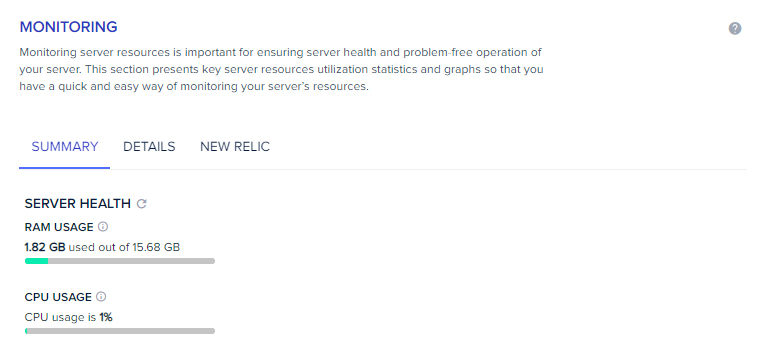
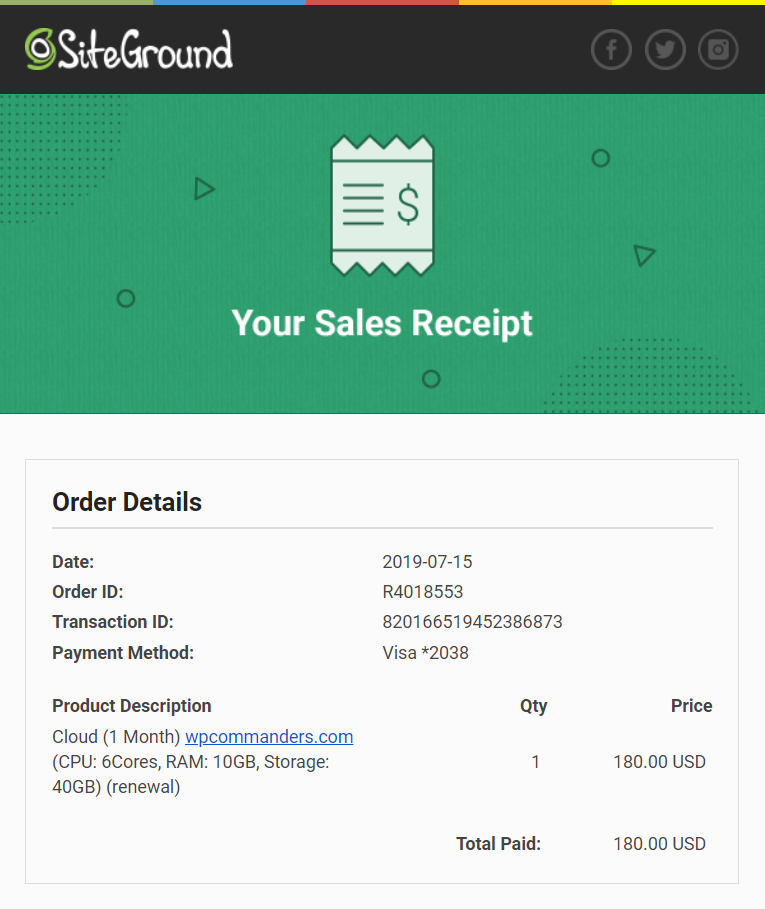

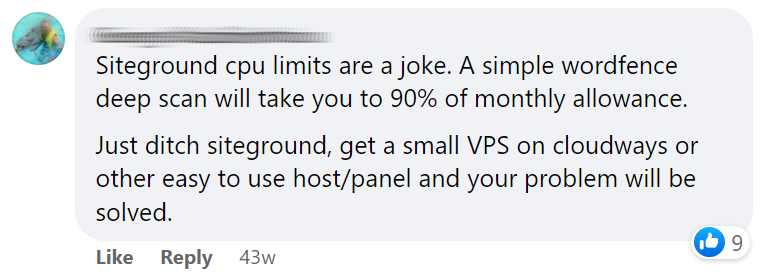


5. Monthly Pricing, Scaling Gets Pricey
Cloudways is monthly pricing with no high renewals.
However, it gets expensive as you scale which is probably the biggest complaint. You’re paying about 2x the price on the Vultr HF website for everything else built around their hosting. That’s why many higher traffic websites use RunCloud or CyberPanel which is a little more hands-on (launching a server on Cloudways can be done in a few clicks instead of provisioning a server).
Cloudways makes it easy to add CPU/RAM. Shared hosts usually trap you into 1-3 year contracts on a plan with a fixed amount of server resources. This can be an issue if your traffic grows or you add plugins/features that need more resources (which is why so many people get screwed).
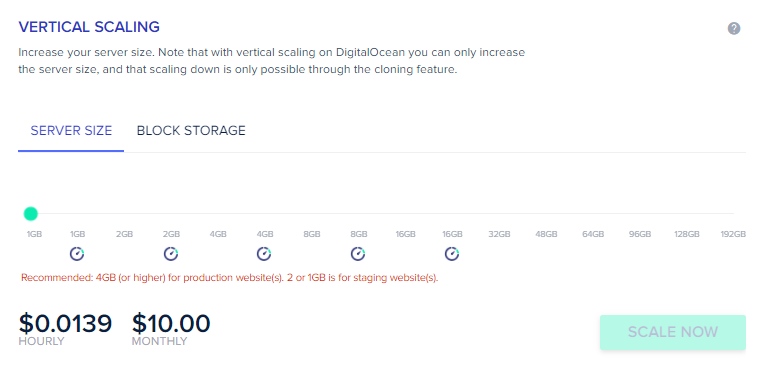
6. Sign Up
You get 30% off 3 months when you sign up though the page they created for me, and yes, I’ll get an affiliate commission. I appreciate it if you do, otherwise no worries. Gotta be transparent.
7. Launch A Server
The next step is to launch a server. Select an application (WordPress or WooCommerce) and name your app/server. Select a cloud host (I recommend Vultr HF), and the server size. 1GB is fine for small sites, 2GB+ for larger/WooCommerce sites. Select the data center closest to your visitors. Cloudways has 19 data centers for Vultr HF while most shared hosts only use around 4-6, so assuming you’re able to use a closer data center, this should already help improve TTFB.
Then click Launch Now.
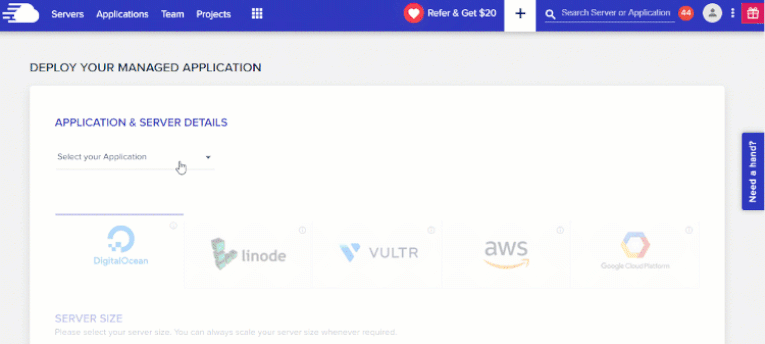
Vultr HF is the most popular with faster NVMe storage, higher CPU clock speeds, and 3GHz+ CPUs. You also have DigitalOcean (and DigitalOcean Premium), Linode, AWS, and Google Cloud.
I don’t recommend Google Cloud since Cloudways uses the lower tier N1 machine family. SiteGround originally used N1 when they moved to Google Cloud but now use N2. Both are for balanced workloads instead of optimized workloads. If you’re doing Google Cloud, you want C2.
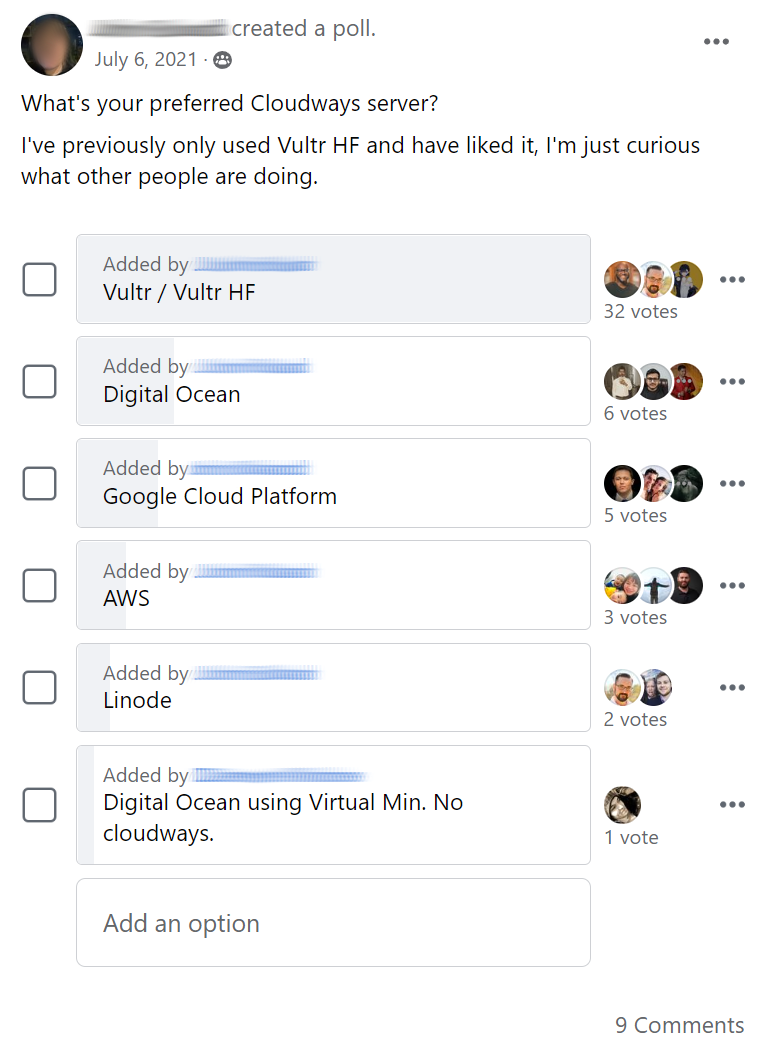
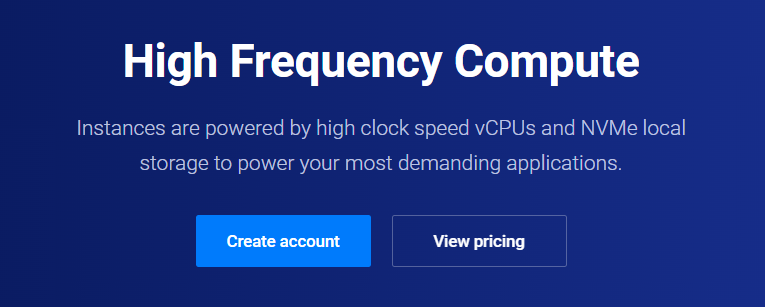
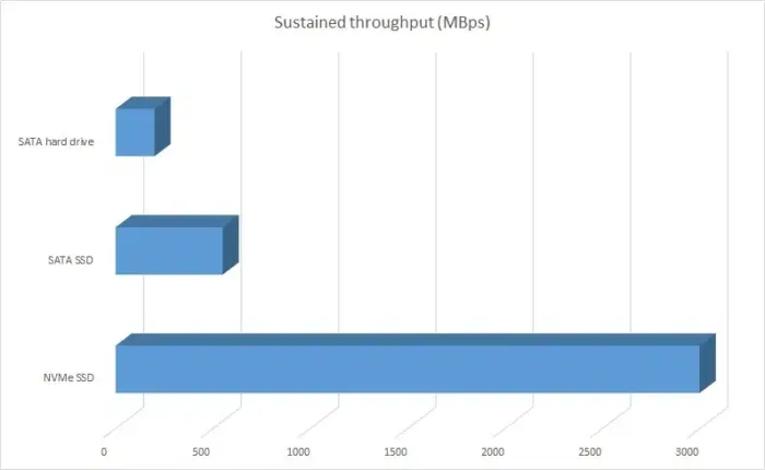
8. Connect Your Domain
After your server is done launching, you’ll connect your domain. Cloudways doesn’t offer domain names so if you don’t have one, I recommend using Google Domains or NameCheap.
Step 1: Add your domain name under Applications → Domain Management. Add the www version as an additional domain if you want to redirect all www links to the non-www version.

Step 2: Update DNS records. In NameCheap, go to Dashboard → Domain List → Manage → Advanced DNS → Add New Record. The A Record value is the Public IP found in Access Details in Cloudways. The CNAME is your domain name. Use the same formatting as below. Here are GoDaddy’s instructions (or Google instructions for the domain registrar you’re using).
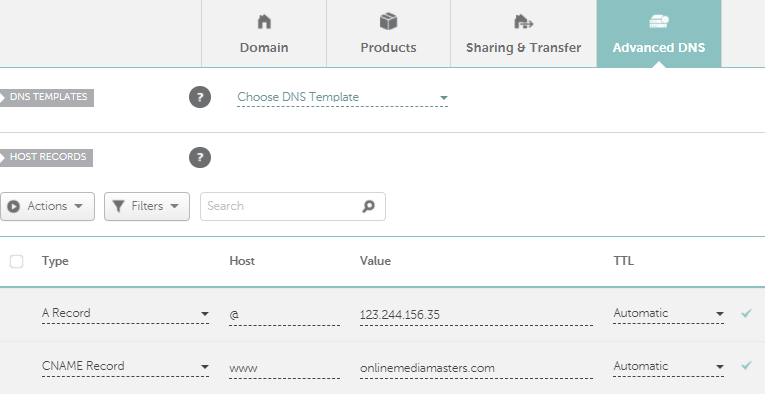
Step 3: Add free Let’s Encrypt SSL (Applications → SSL Certificate) and enable auto renewal.
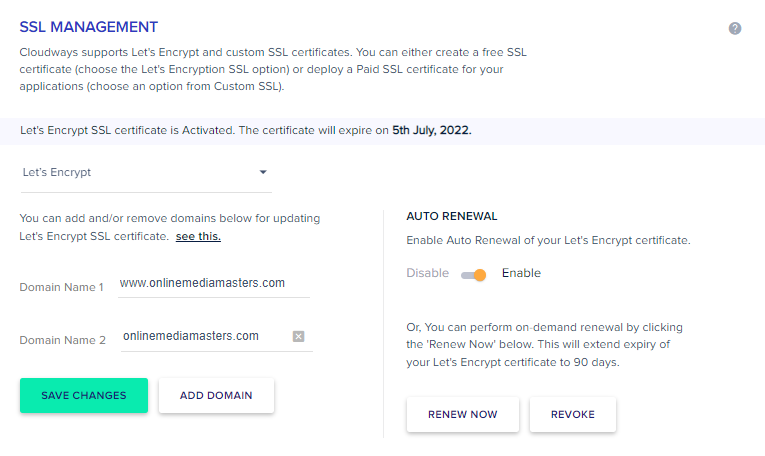
Cloudways also has a video on this.
9. Request A Free Migration
Request a free migration (9 squares → Add-ons → Application Migration). The first migration is free then it’s $25/site which is cheaper than most hosts. I had them move my site with no issues.
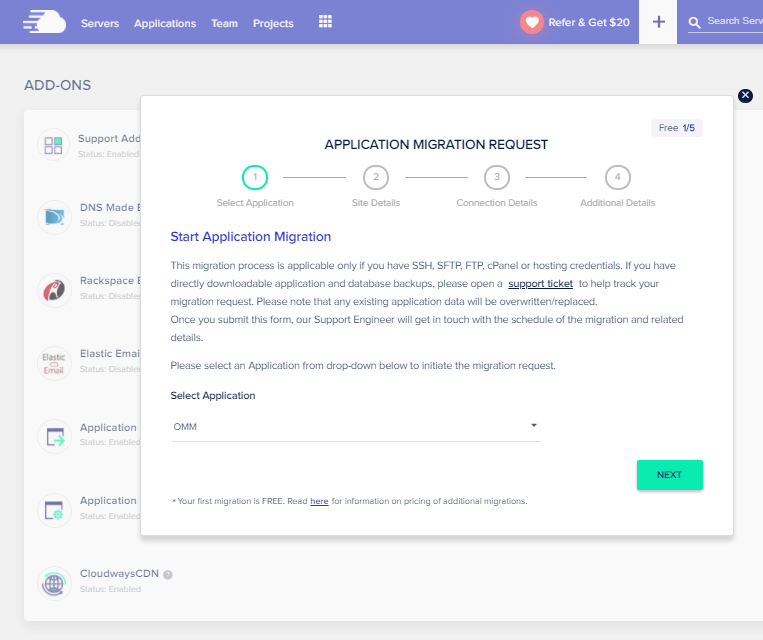
Or DIY with the Cloudways WordPress Migrator plugin.
10. Cloudflare Enterprise
Cloudways has a Cloudflare Enterprise add-on for $5/mo, so here are my thoughts.
The 3 biggest complaints are no APO (yet), challenge pages, and the settings are very limited with no option to use free Cloudflare features like page rules, firewall rules, crawler hints, SXGs.
But have you actually tried it? I did and my site was much faster compared to using Cloudflare Pro directly from Cloudflare (and that’s really all I care about, along with improved security). I found the Enterprise features you gain in the add-on outweigh the free features you lose.
Cloudways doesn’t include all Enterprise features if you were to buy it directly from Cloudflare, but are you really going to pay $200/month+ instead of $5/month on Cloudways? Probably not.
It does present users with more challenge pages which you can only customize when using Cloudflare Pro+ directly from Cloudflare. So while it did make my site faster, I think it needs quite a bit of work. It seems like they’re playing catch up with Rocket.net who offers it for free with full page caching, no challenge page on the frontend, no configuration, and an overall smoother integration (their CEO Ben Gabler also has a long history of working with the edge and went as far as building Rocket.net’s own data centers in the same locations as Cloudflare).
| Cloudflare Free | FlyingProxy Cloudflare Enterprise | Cloudways Cloudflare Enterprise | Rocket.net Cloudflare Enterprise | |
|---|---|---|---|---|
| APO | $5/mo | ✓ | x | ✓ |
| Argo Smart Routing | Paid feature | x | ✓ | ✓ |
| Priority routing | x | ✓ | ✓ | ✓ |
| Load balancing | Paid feature | ✓ | ✓ | ✓ |
| Mirage/Polish | Requires CF Pro | ✓ | ✓ | ✓ |
| Enterprise DDoS protection | x | ✓ | ✓ | ✓ |
| Bandwidth | Unlimited | 100GB | 100GB | Determined by hosting plan |
| Challenge pages | Not often | Not often | Too often | Not often |
| Price | Free | $10/mo | $5/mo | Free w/ hosting |
Key differences between third-party Cloudflare Enterprise services (and Cloudflare free)
Features
- Enterprise CDN – prioritized routing with CDN cache and unique IPs up to 100GBs.
- Managed WAF – includes PCI compliance with advanced bot management & mitigation.
- DDos Protection – prioritized for layers 3, 4, 7 with prioritized IP ranges and 100% SLA.
- Image Optimization – Mirage + Polish compress images, resizes them for mobile, serves them in WebP, strips EXIF data, etc. I definitely prefer this over image optimization plugins.
- Full Page Cache (Coming Soon) – I’m hoping they add this soon just as much as you are.
- Argo + Tiered Cache – routes your traffic through the fastest Cloudflare network paths.
- Global load balancing – creates a failover so traffic is re-routed from unhealthy origin servers to healthier origins. This can reduce things like latency, TLS, and general errors.
- HTTP/3 access – you still get HTTP/3 when using the CF Enterprise add-on on Cloudways.
Setup Instructions
Cloudways also has a guide on this.
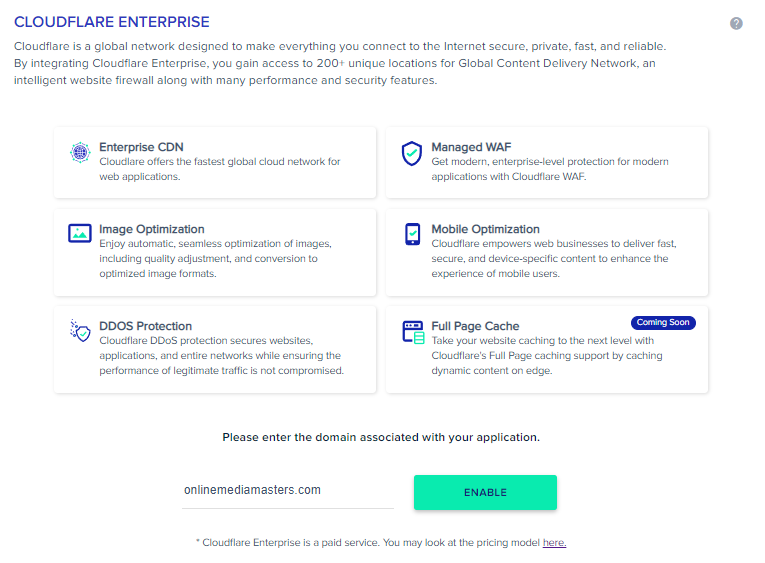
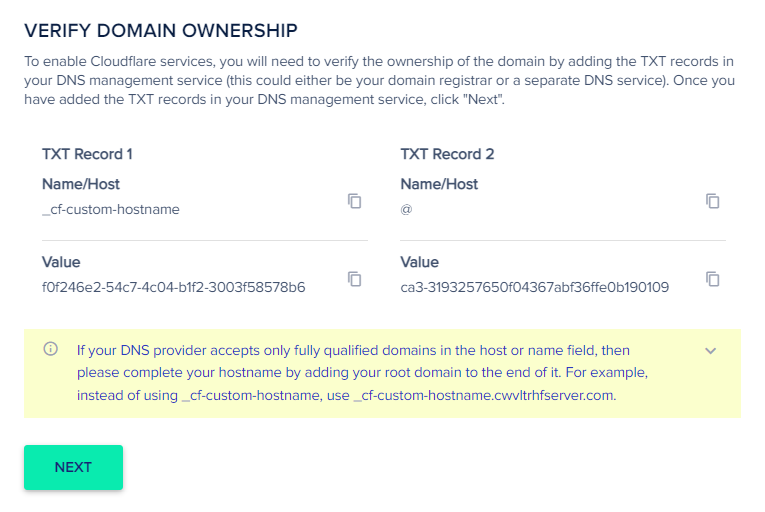
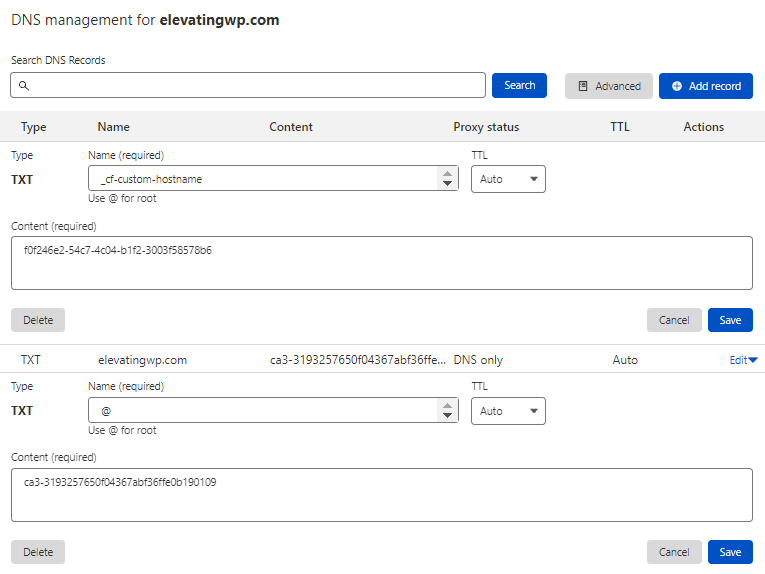
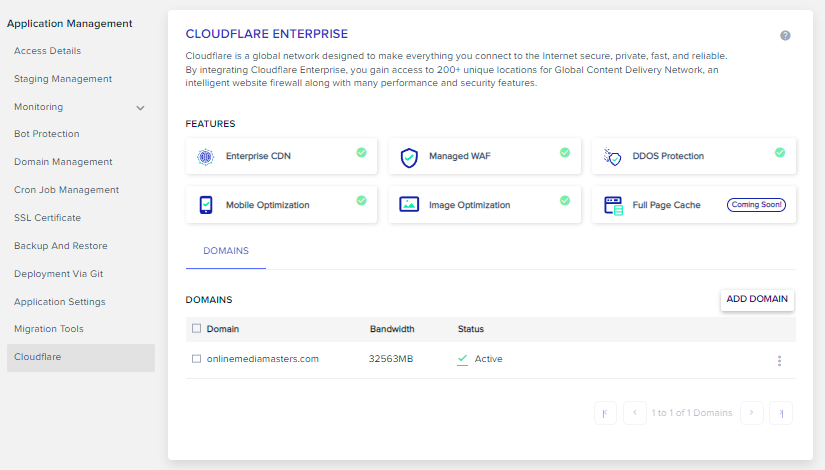
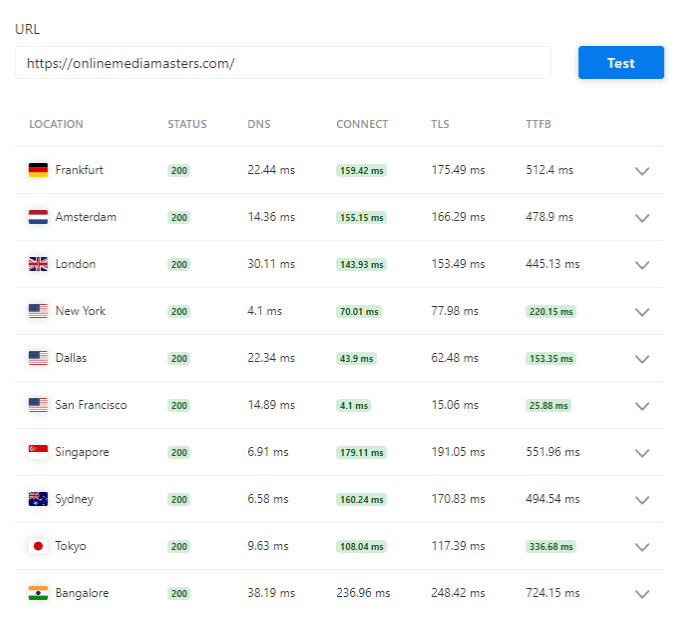
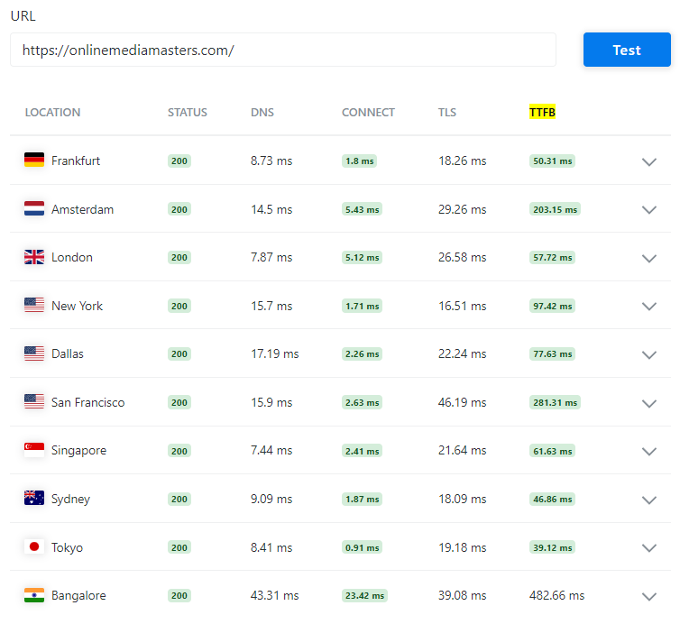
11. Redis Object Cache Pro
Redis Object Cache Pro is free on Cloudways and can be enabled under Servers → Settings & Packages → Packages → Install Redis. Cloudways will then install Redis as a drop-in plugin under your WordPress plugins menu. Stack Overflow has a nice thread on memcached vs Redis.
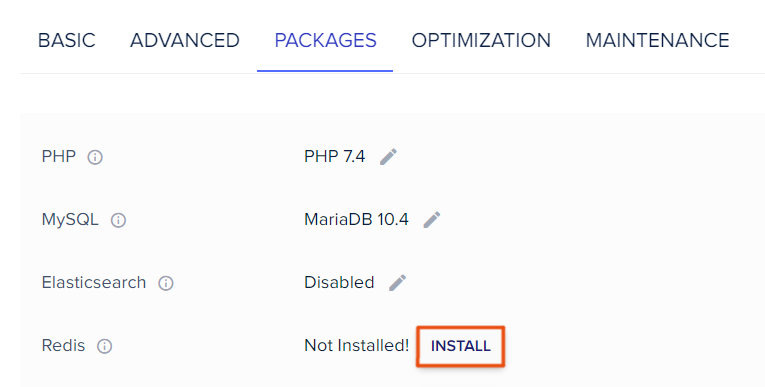
Here’s the table Cloudways shows on their blog:
| W3 Total Cache | LiteSpeed Cache | WP Redis | Redis Object Cache | Object Cache Pro | |
| Performance | |||||
| Batch Prefetching | x | x | x | x | ✓ |
| Data compression | x | x | x | x | ✓ |
| Cache priming | x | x | x | x | ✓ |
| Asynchronous flushing | x | x | x | ✓ | ✓ |
| Features | |||||
| Cache Analytics | x | x | x | ✓ | ✓ |
| Secure connections | x | x | x | ✓ | ✓ |
| Highly customizable | x | x | x | x | ✓ |
| Logging support | x | x | x | x | ✓ |
| Cluster support | x | x | x | ✓ | ✓ |
| Replication support | x | x | x | ✓ | ✓ |
| Reliability | |||||
| Mitigates race conditions | x | x | x | x | ✓ |
| Extensively unit tested | x | x | x | x | ✓ |
| Integrations | |||||
| WooCommerce optimized | x | x | x | x | ✓ |
| Query Monitor integration | x | x | x | Basic | Advanced |
| WP CLI integration | Basic | x | Basic | Basic | Advanced |
| Site Health checks | x | x | x | x | ✓ |
| Batcache compatible | x | x | x | ✓ | ✓ |
| Relay integration | x | x | x | x | ✓ |
12. Use FlyingPress, Not Breeze
Cloudways has been making improvements to Breeze, but I still recommend FlyingPress.
It just does a better job addressing core web vitals. Compared to WP Rocket, FlyingPress has more features and it also optimizes for real-world browsing better. For example, Perfmatters agrees that when removing unused CSS, loading the used CSS in a separate file is faster for real visitors while inline is better for “scores.” Things that may seem small can make a big difference.
| Breeze | WP Rocket | FlyingPress | |
|---|---|---|---|
| Remove unused CSS | x | Inline | Separate file |
| Critical CSS | x | ✓ | ✓ |
| Bloat removal | x | x | ✓ |
| Host fonts locally | x | x | ✓ |
| Preload images | x | x | ✓ |
| Lazy load background images | x | Inline HTML | lazy-bg class |
| Exclude images from lazy load | x | By number | By number |
| YouTube iframe preview image | x | ✓ | ✓ |
| Self-host YouTube placeholder | x | x | ✓ |
| Add missing image dimensions | x | ✓ | ✓ |
| Lazy render HTML elements | x | x | ✓ |
| Scheduled database cleanups | x | ✓ | ✓ |
| Frequent new features | x | x | ✓ |
| Documentation | Needs more detail | Detailed | Needs more detail |
| Price | Free | $59/year | $60/year |
| Renewal price | Free | $59/year | $42/year |
| Facebook group | Cloudways Users | WP Rocket Users | FlyingPress |
13. More Cloudways Optimizations
Here are a few other optimizations you can make on Cloudways. These can depend on whether your site is WooCommerce or low/high traffic. Cloudways also has quite a bit of documentation.
- Use PHP 8.0+.
- Use MariaDB 10.4.
- Use a 512MB memory limit or higher.
- Activate Redis add-on (see previous step).
- Use FlyingPress instead of Breeze (see previous step).
- Configure Varnish rules to exclude URLs/cookies if needed.
- Activate Varnish add-on (specifically good for eCommerce sites).
- Increase PHP-FPM memory limit from 32M (mine is set to 1024M).
- Schedule backups during non-peak hours if you’re using Cloudways for backups.
- Use Cloudflare’s DNS (see dnsperf.com). Not related to Cloudways, but important.
- Replace wp-cron with a real cron job (use code below or see Cloudways instructions).
- Use error logs to find bad bots, URL requests, status code errors, slow pages/queries.
- max_execution_time: 30-60s, max_input_time: 60s, max_input_vars: 1000 (what I used).
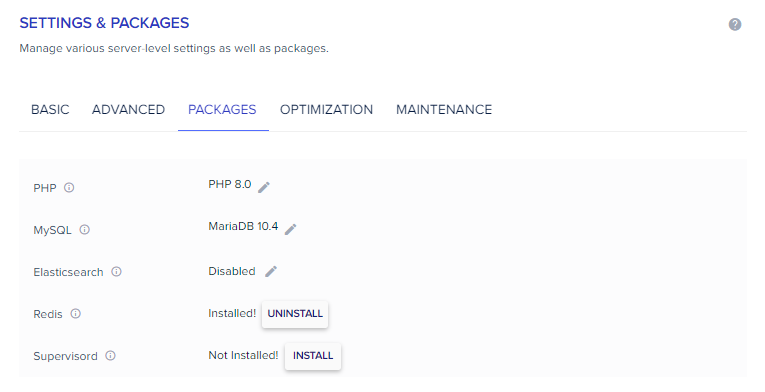
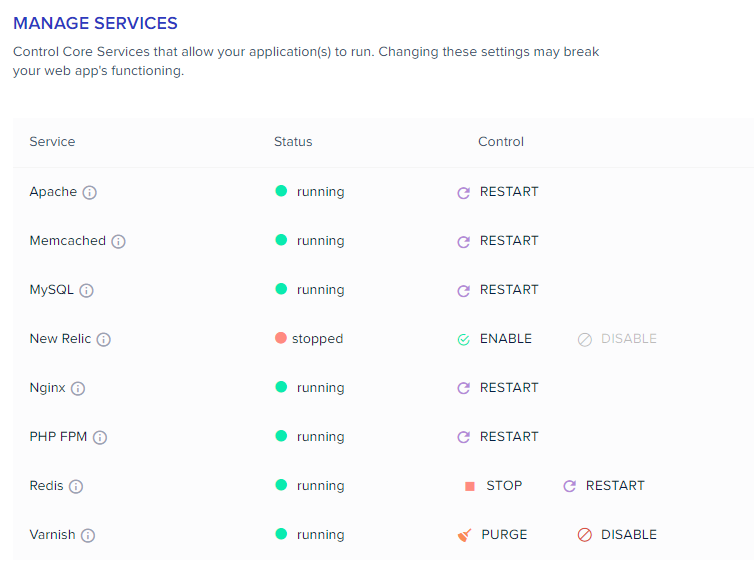
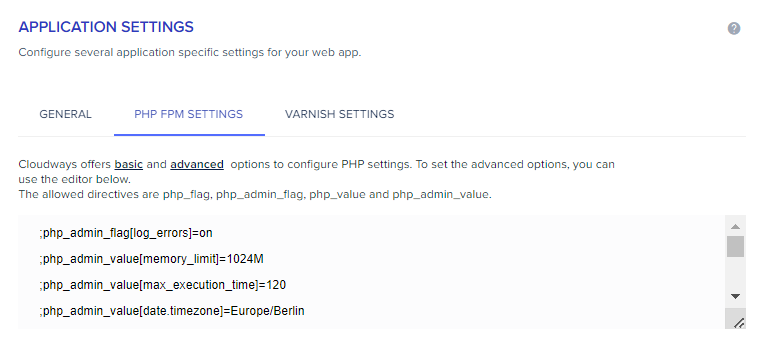
This is the code for adding a cron job (remember to disable wp-cron beforehand). This can specifically help reduce CPU usage by preventing wp-cron from loading on every pageview.
*/5 * * * * wget -q -O - 'https://wordpress-413270-1299955.cloudwaysapps.com/wp-cron.php?doing_wp_cron
14. No Email Hosting
Keeping web/email hosting separate is a good thing (besides price) since emails take up inodes/files. You also want resources to only be dedicated to hosting your website and not email. Plus, if you decide to switch hosts, you don’t have to switch emails which can be a pain.
Cloudways only offers Rackspace for $1/email per month but I use Google Workspace (Cloudflare also started offering free email addresses). I’ve never used Rackspace so I can’t comment on whether it’s good vs. bad or setting it up. I’ve always preferred Google Workspace.
15. You’ll Want A Separate Backup Plugin
I also recommend a third-party backup plugins service like UpdraftPlus or ManageWP.
Cloudways also charges $0.033/GB for local backups which can be downloaded via SSH/SFTP, but they only provide 1 copy of the latest backup. And while I’ve never had a problem, I have heard a few horror stories of backups getting deleted, etc. Regardless of your host, it’s always a good idea to have off-site backups by a third-party service so your eggs aren’t all in one basket.
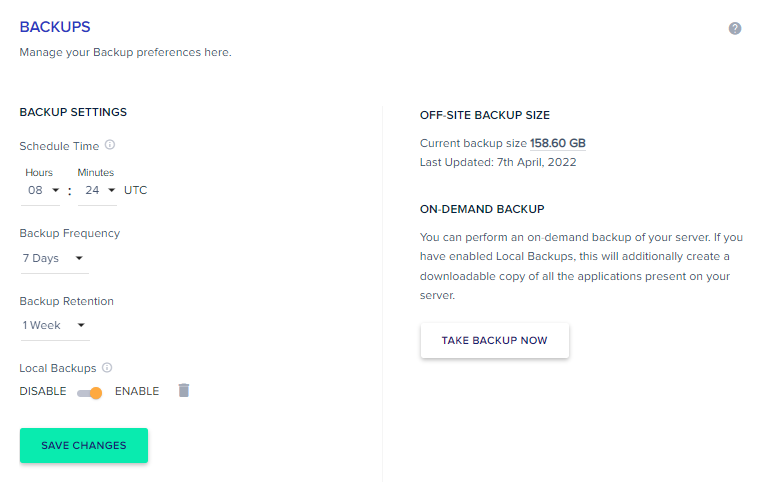

16. File Manager Workaround
Cloudways doesn’t have a file manager, but they do have SFTP.
Also, thanks to Roger for pointing out a workaround in the comments for people coming from cPanel. Since Cloudways doesn’t have a file manager, you can download and upload Tiny File Manager via SFTP which gives you access to functions like Zip, Unzip, Create, Delete, Modify, View, Quick Preview, Download, Copy, and Move files (see more features on the GitHub page).
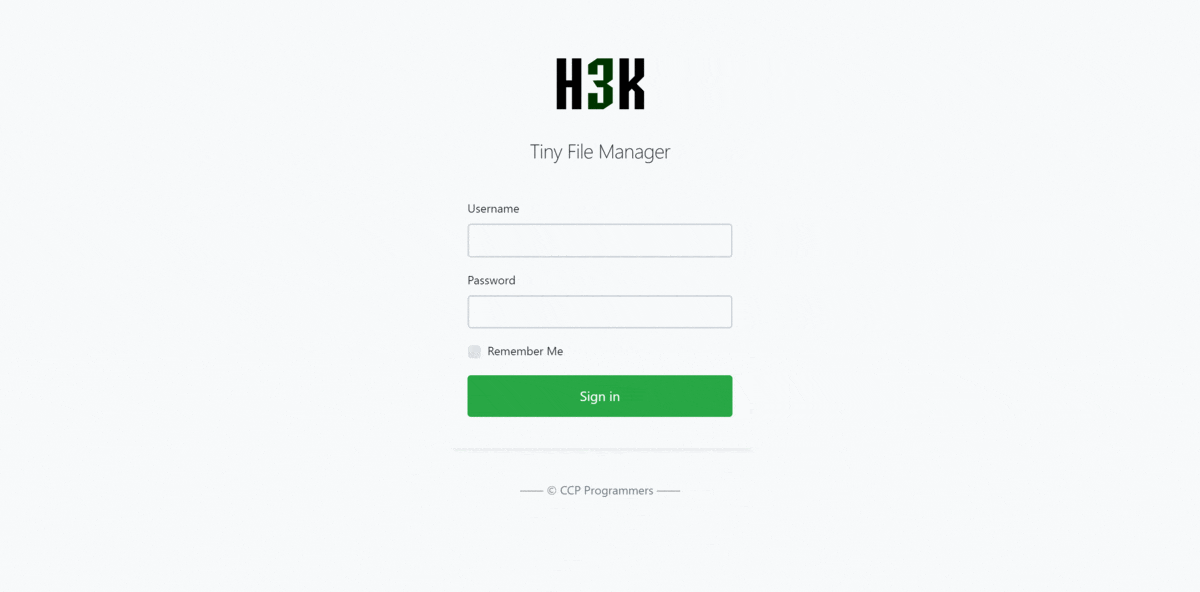
17. Support Isn’t Great
While this is something you have to experience yourself, I’ve always been very happy with Cloudways support. It ain’t Kinsta, but it’s better than SiteGround. I haven’t had many issues I’ve needed to contact support for, so that’s a good thing.
One thing I suggest (especially if you’re new) is to reach out to their community manager Muhammed Moeez if you have pre-sales questions. Before I moved, I reached out to them on Facebook so I could have peace of mind more than anything. They also have a Facebook Group.


18. Navigating The Dashboard
Sign up for a Cloudways demo if you want to check out the dashboard.
The Server tab is where you can change settings for Redis, Varnish, PHP version, MariaDB, memory limit, backups, scale your server, configure SMTP, and monitor CPU/RAM/DISK usage.
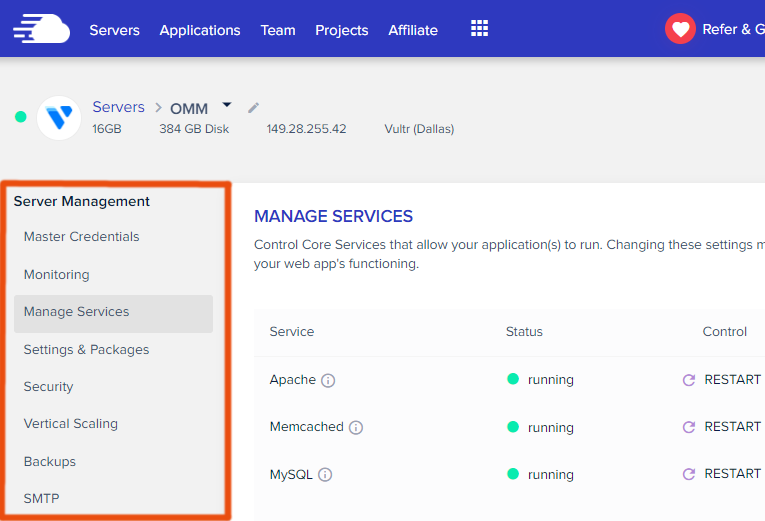
The Application tab has your WordPress login details and lets you create staging sites, monitor traffic + errors logs, add domains, configure SSL, manage cron jobs, restore backups or take one on-demand, and tweak Application settings (Varnish, WebP, XML-RPC, PHP-FPM, Varnish, etc).
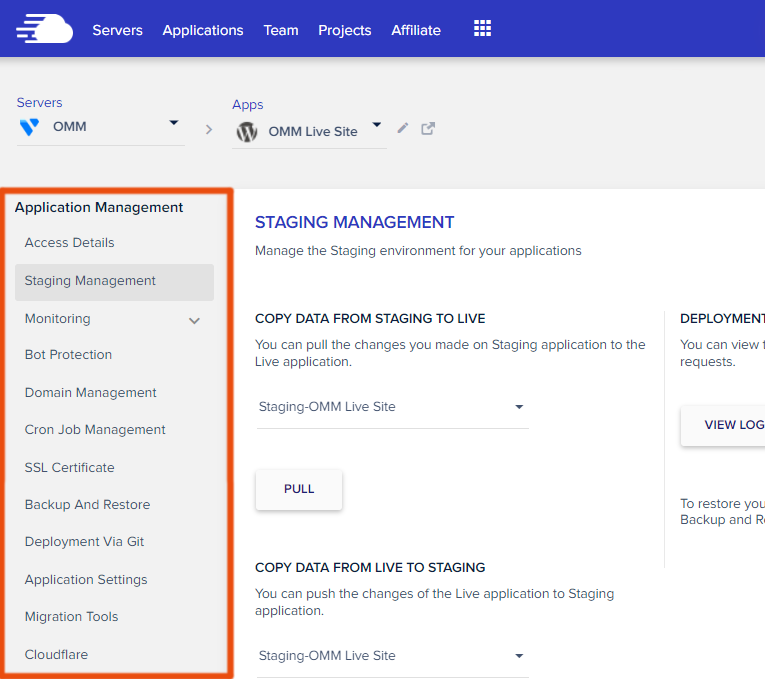
19. Cloudways Acquired By DigitalOcean
Cloudways was acquired by DigitalOcean.
I don’t like how they raised prices for every other cloud provider by $2-3/month, then DigitalOcean by $1/mo (and sometimes kept the same price). They’re making DigitalOcean more attractive and while they’re a good choice, Vultr High Frequency is still arguably faster.
20. Pros & Cons
Pros
- Cloud hosting is obviously faster than shared.
- Vultr HF has high CPU clock speeds + NVMe storage.
- Cloudflare Enterprise is great for both TTFB + LCP.
- Multiple caching layers (Redis, memcached, Varnish, etc).
- They use MariaDB which is comparatively faster than MySQL.
- PHP-FPM tends to use memory more efficiently than FastCGI.
- Stays updated on PHP versions (currently supports PHP 8.2).
- Monthly pricing without yearly contracts or high renewal prices.
- Free migration, 3-day trials, and promo code makes it easy to try.
- Many reports of Cloudways fixing CPU issues on shared hosting.
- More control of specific server settings (see WP Johnny’s guide).
- 44 data centers to choose from between all their cloud providers.
- Choice of 5 cloud providers: DO, Vultr, AWS, Google Cloud, Linode.
- Launching a server and using their migrator plugin is straightforward.
Cons
- Apache servers.
- No email hosting (use Google Workspace).
- Some CPU usage complaints on small servers.
- No file manager (use SFTP or Tiny File Manager).
- Cloudways Breeze plugin isn’t great (use FlyingPress).
- Scaling CPU/RAM for larger websites can get expensive
- Cloudflare Enterprise needs APO, + less challenge pages.
- Offsite backup storage is $0.033/GB per server (use a third-party service).
- New customers sometimes have to show ID to get their account approved.
21. More Migration Results
Other people who moved to Cloudways and posted results:
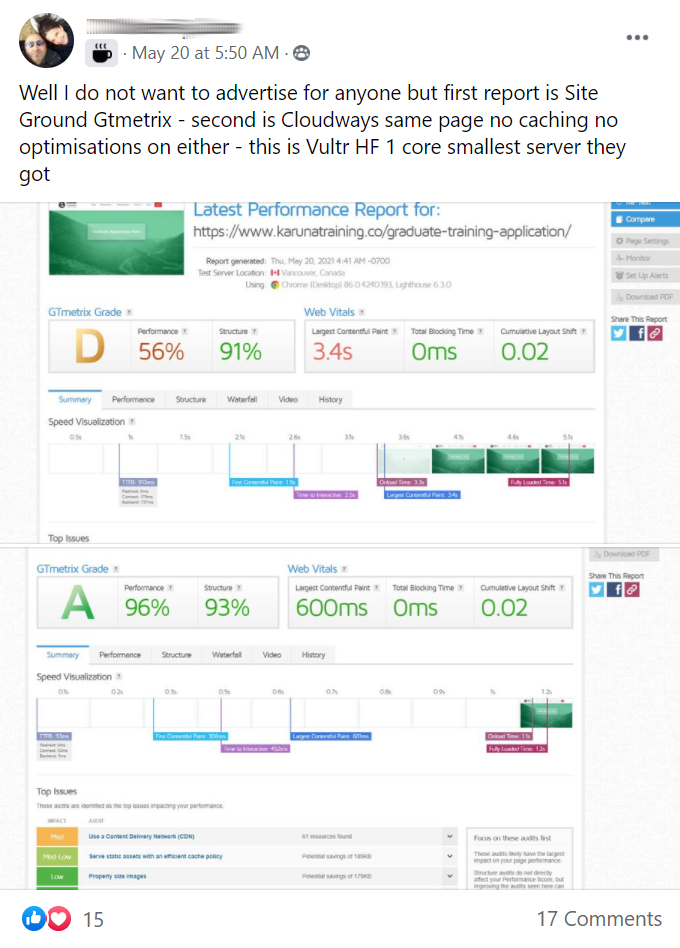
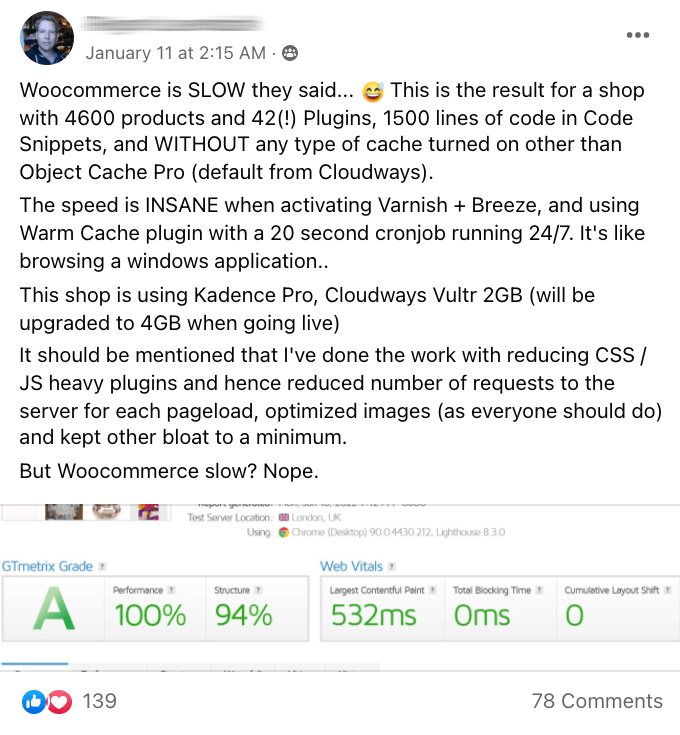
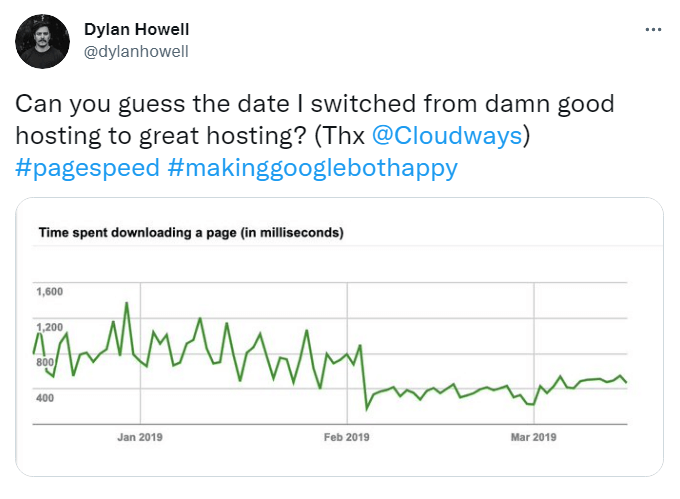
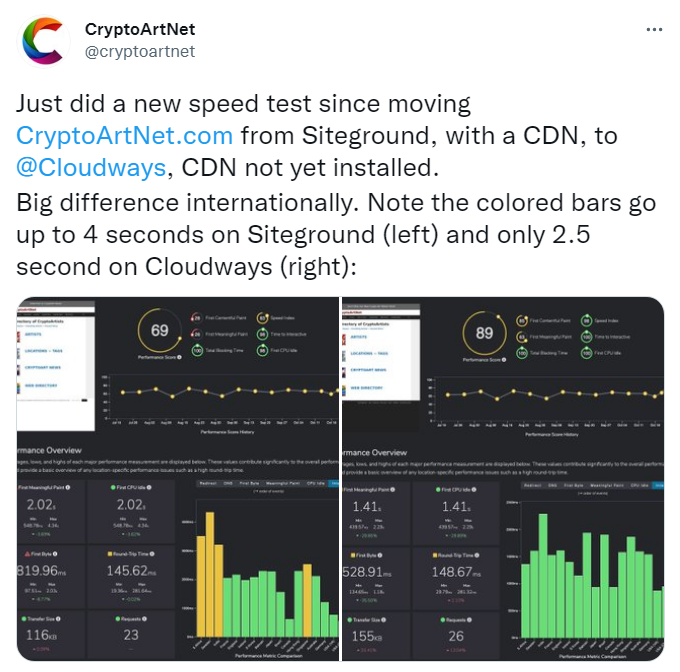
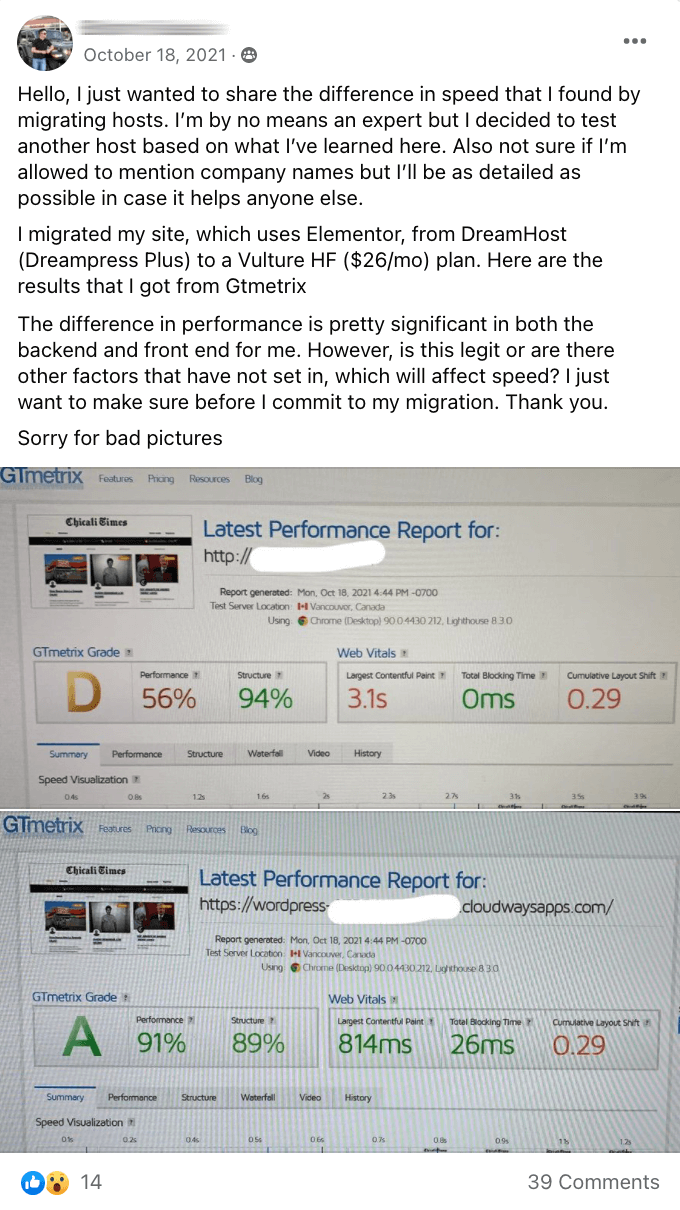
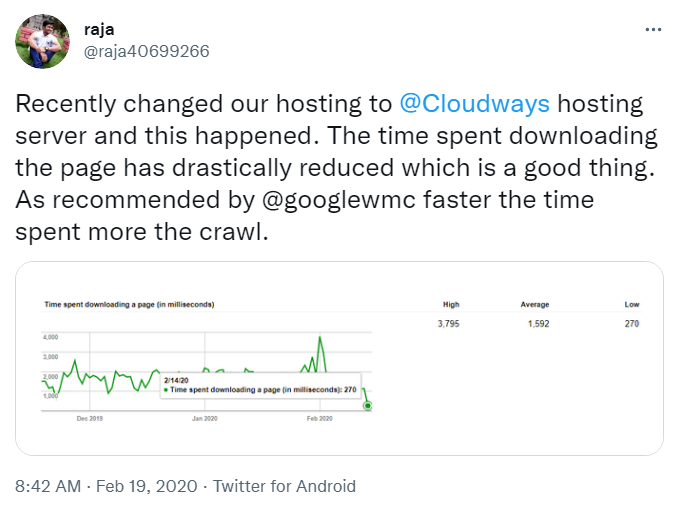
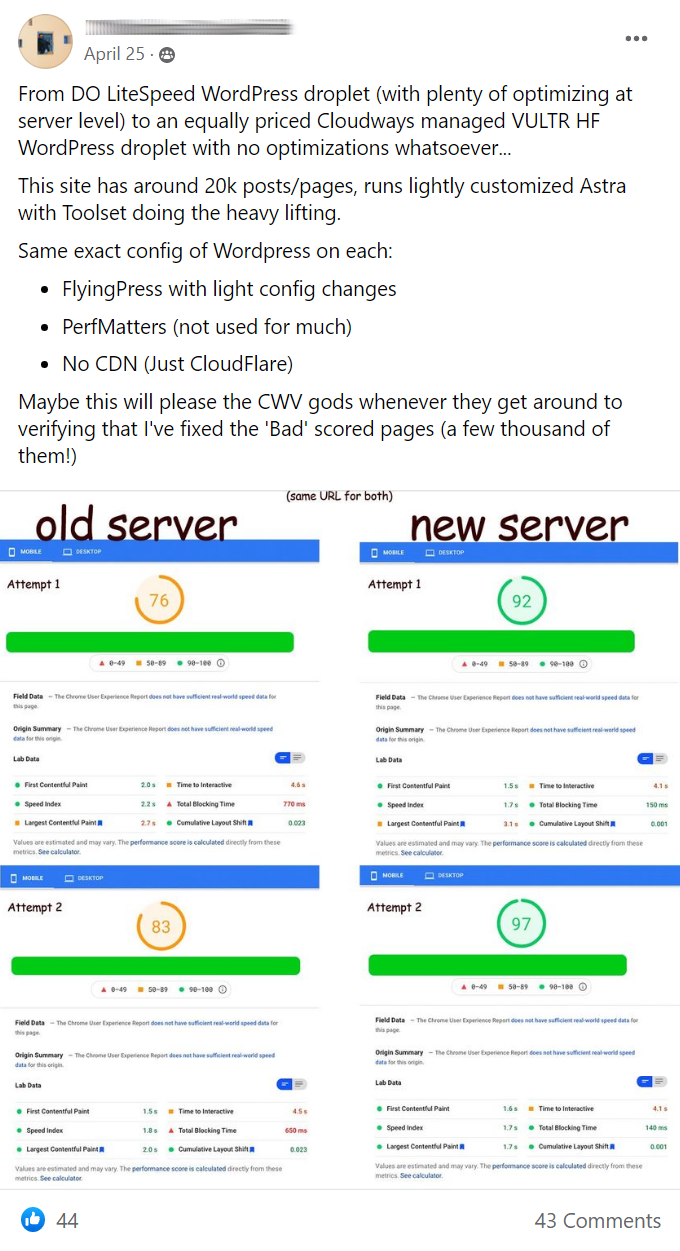
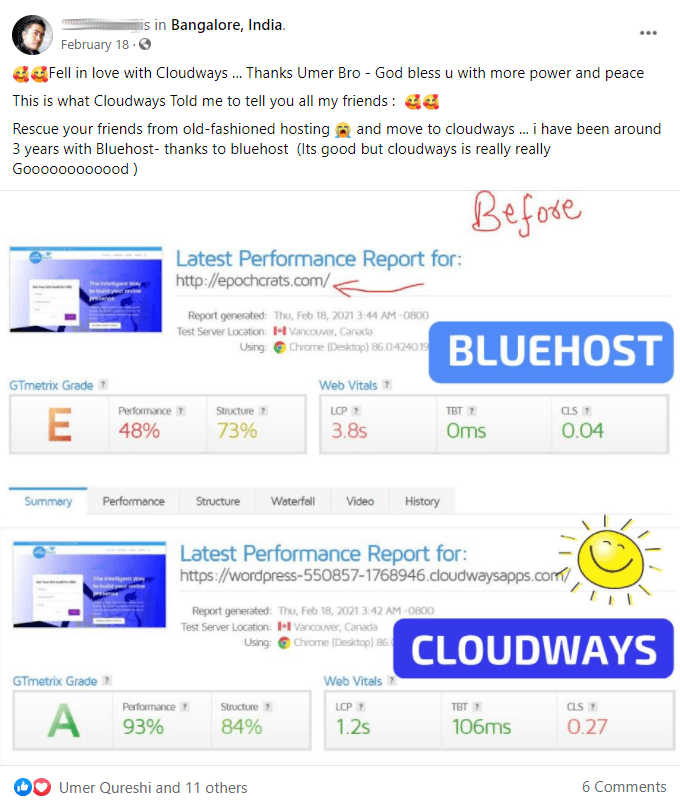
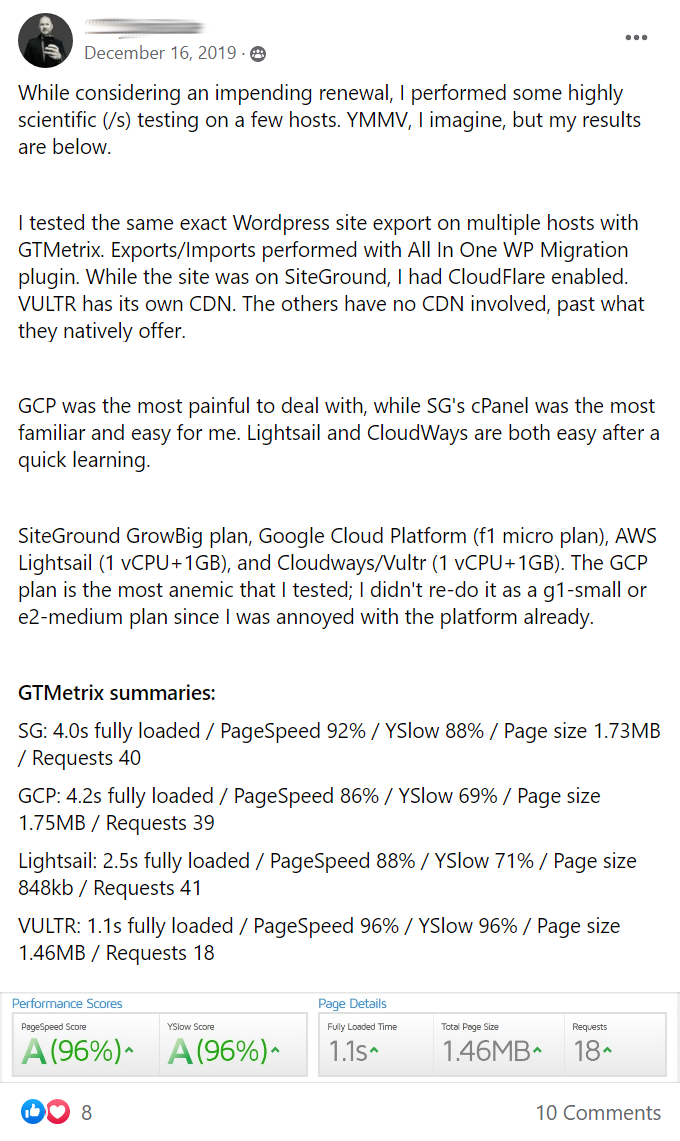

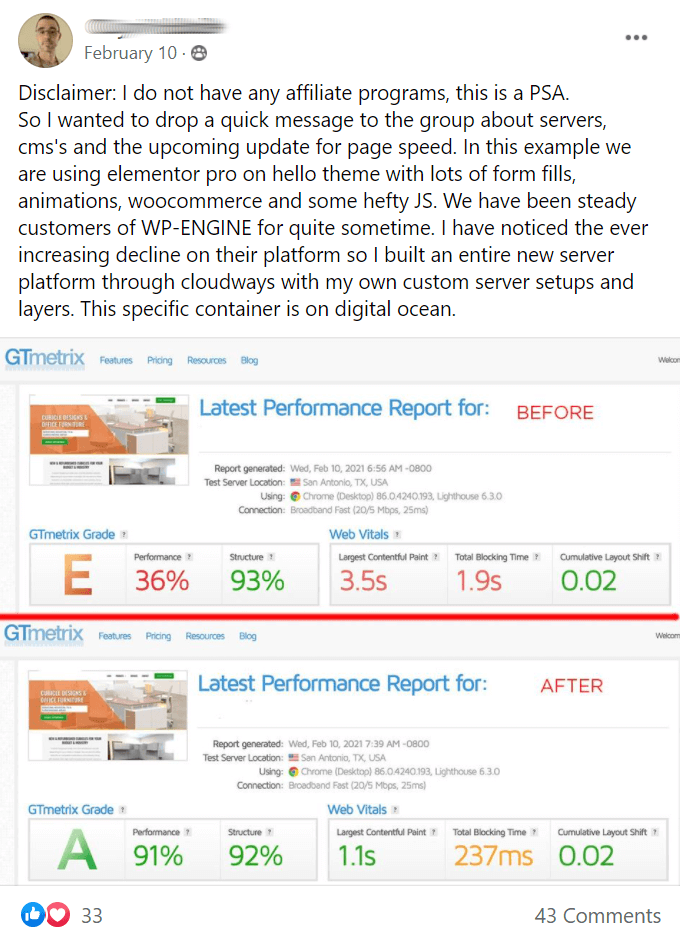
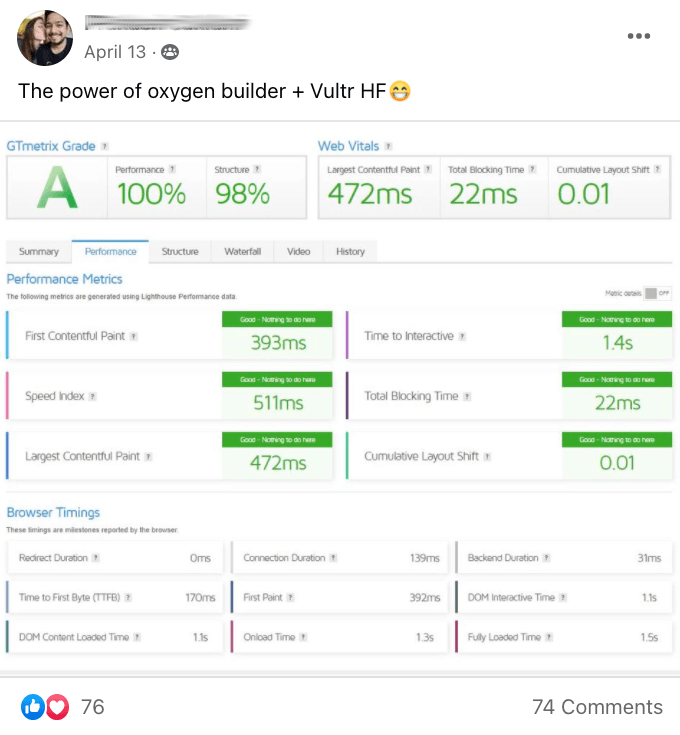
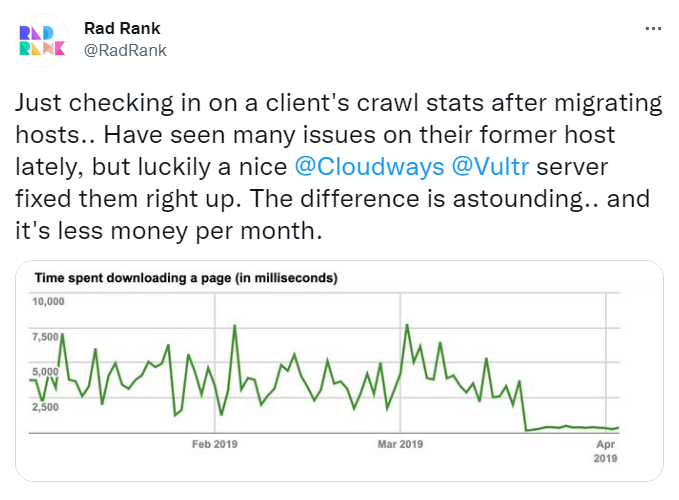
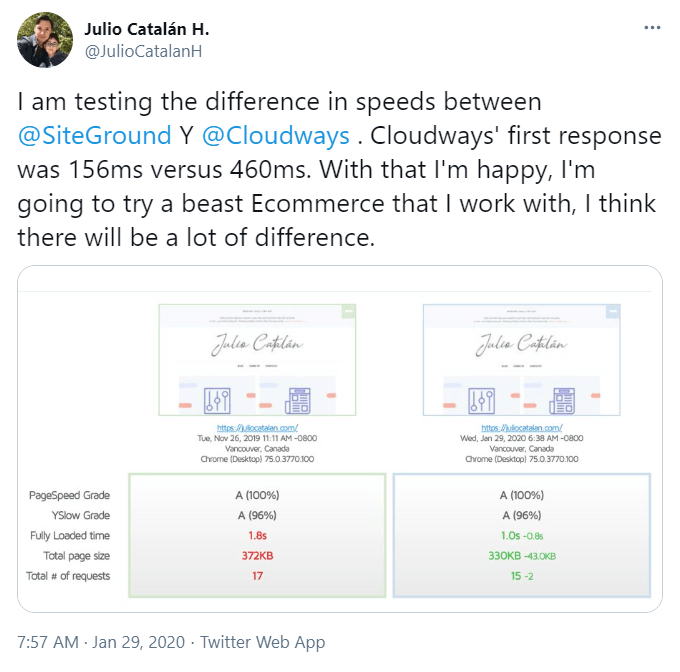

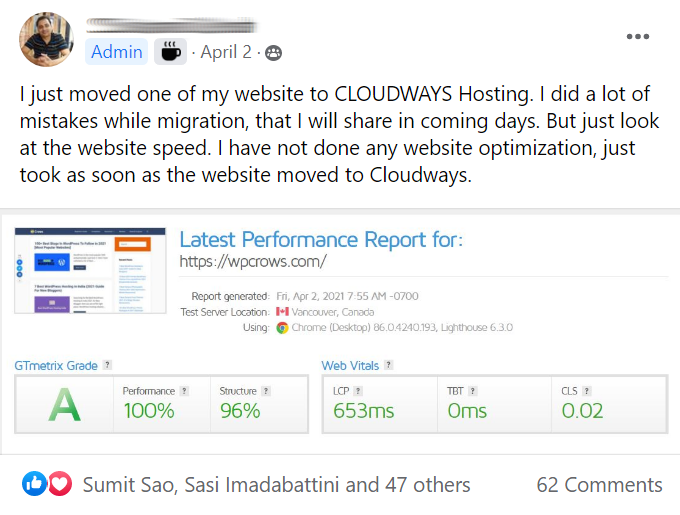
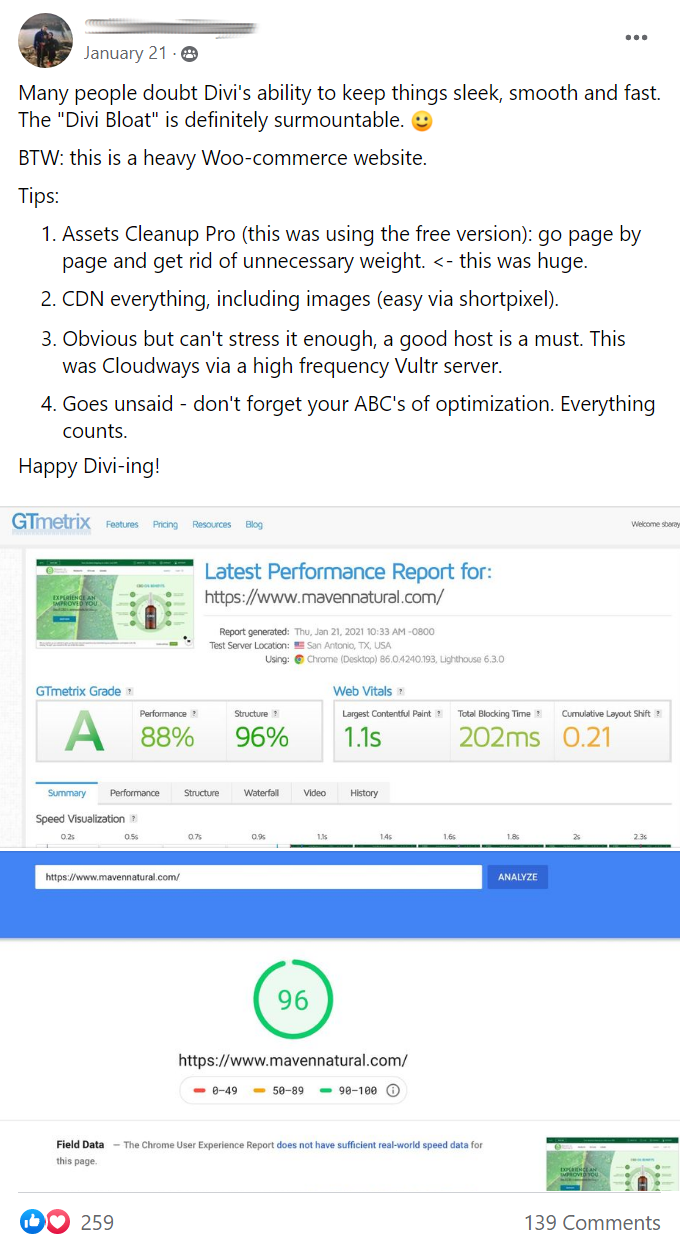
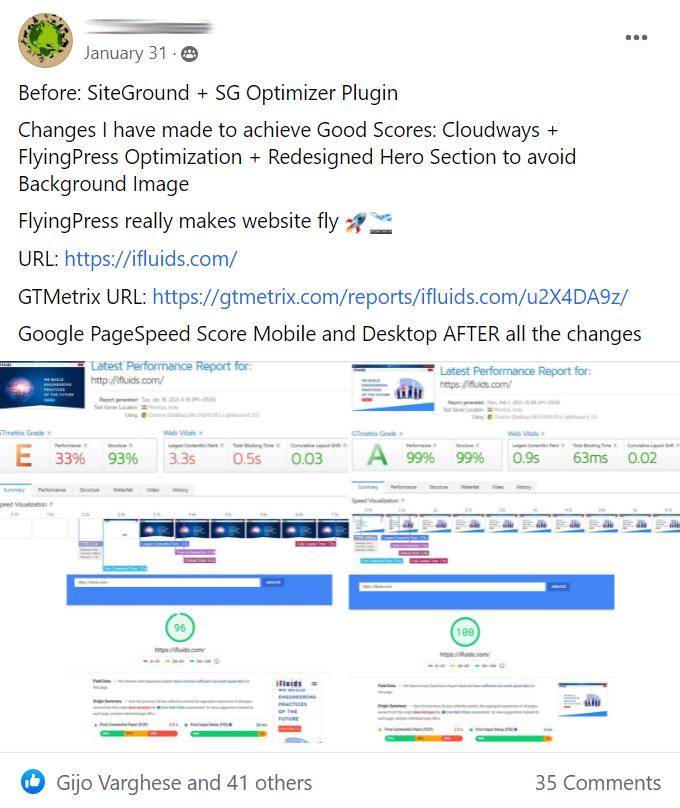
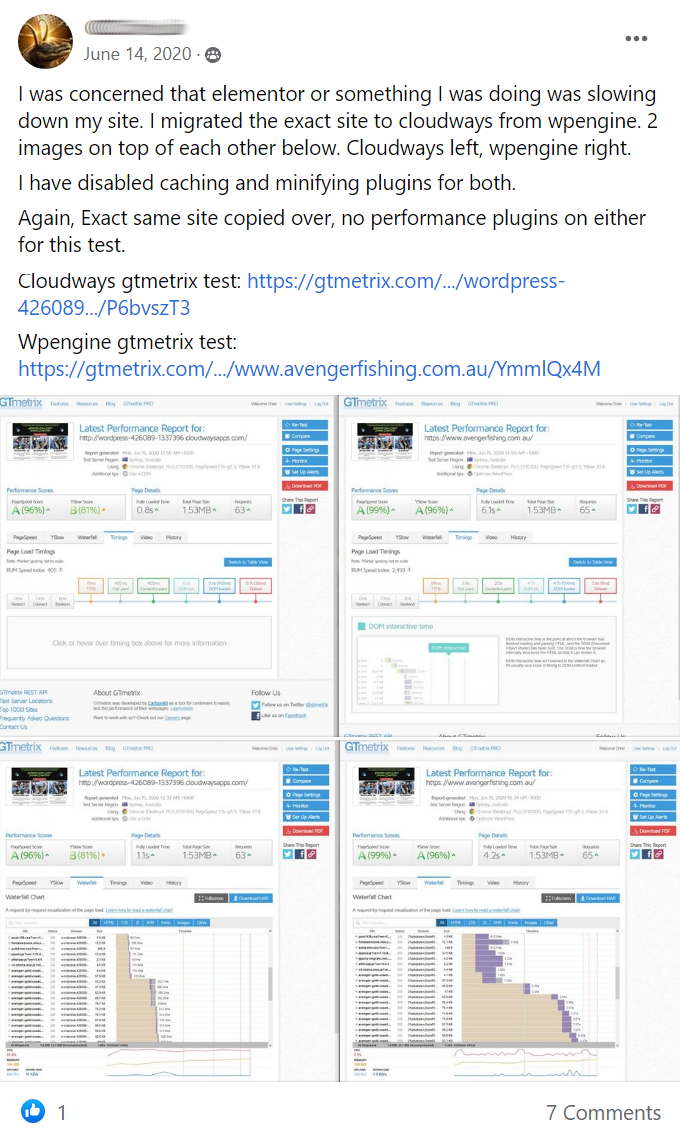
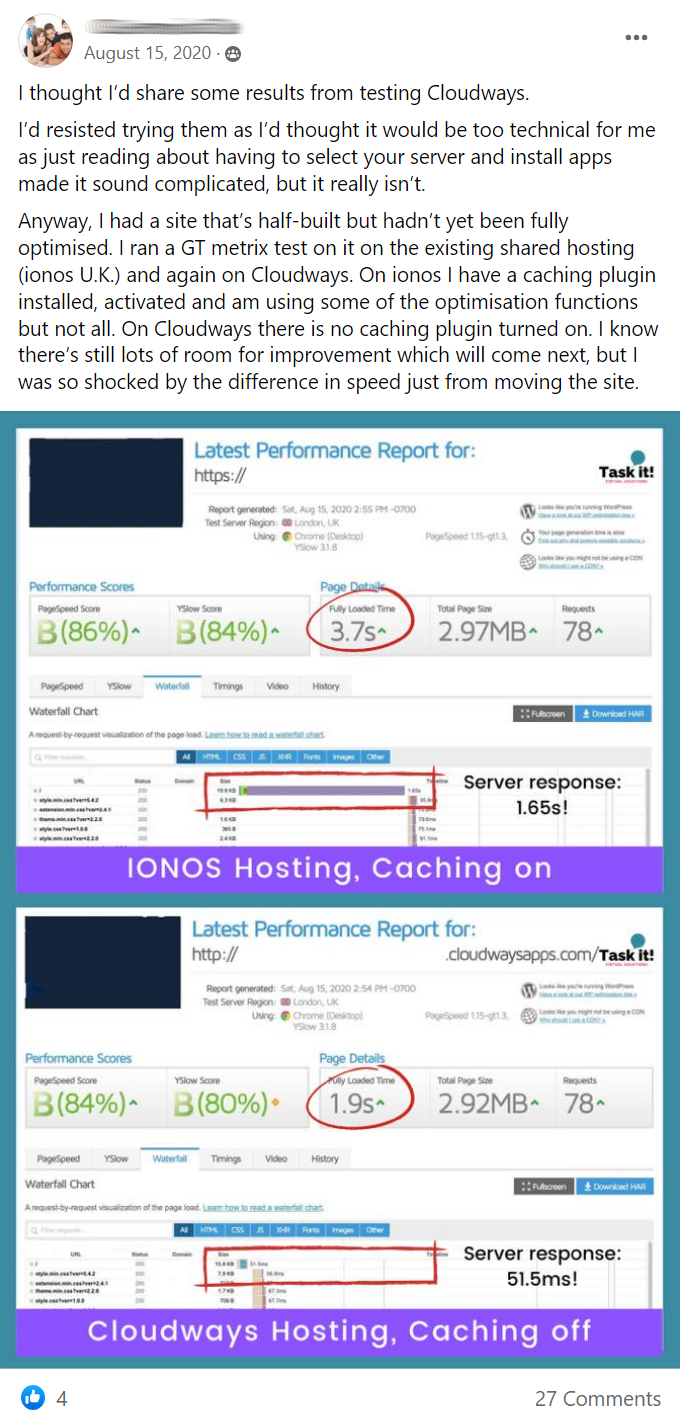
22. Great Feedback In Facebook Groups
Here are some polls/threads about Cloudways:
- Cloudways vs Bluehost
- Cloudways vs A2 Hosting
- Cloudways vs NameHero
- Cloudways vs SiteGround
- Cloudways vs SiteGround (2)
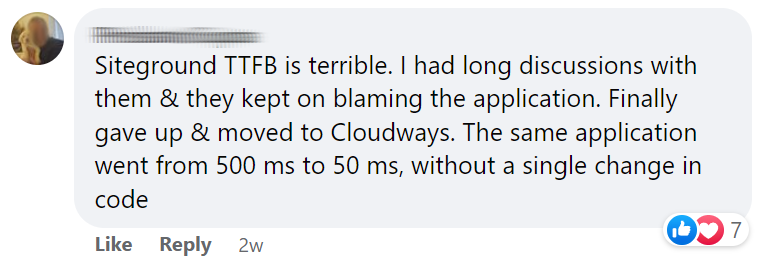
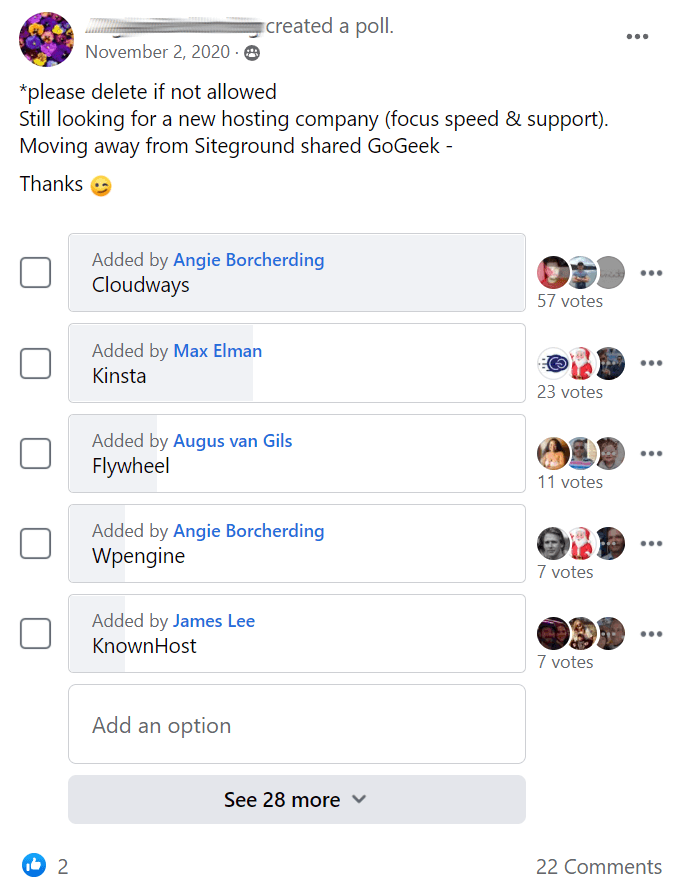
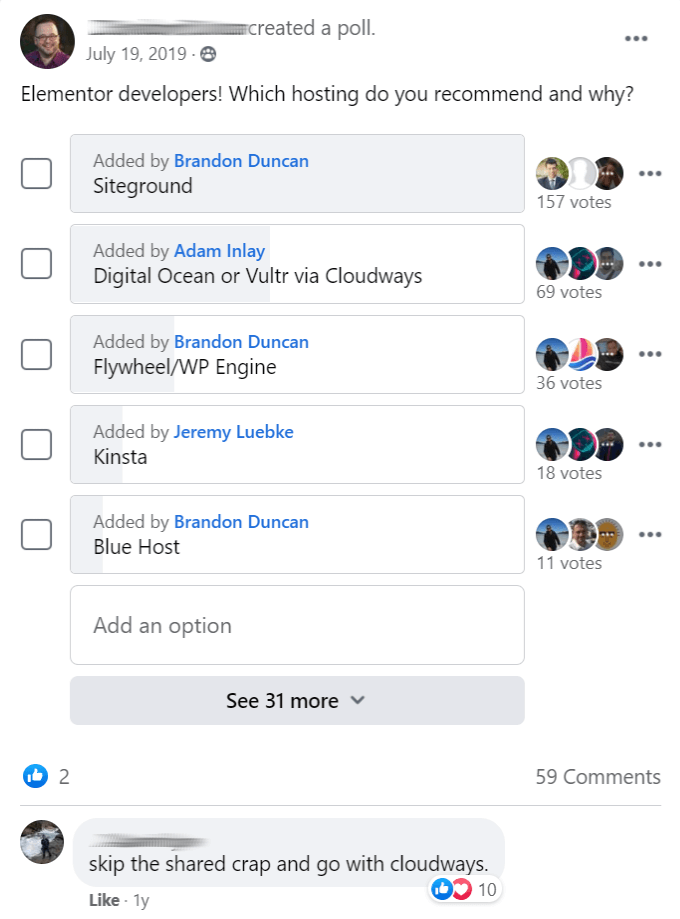
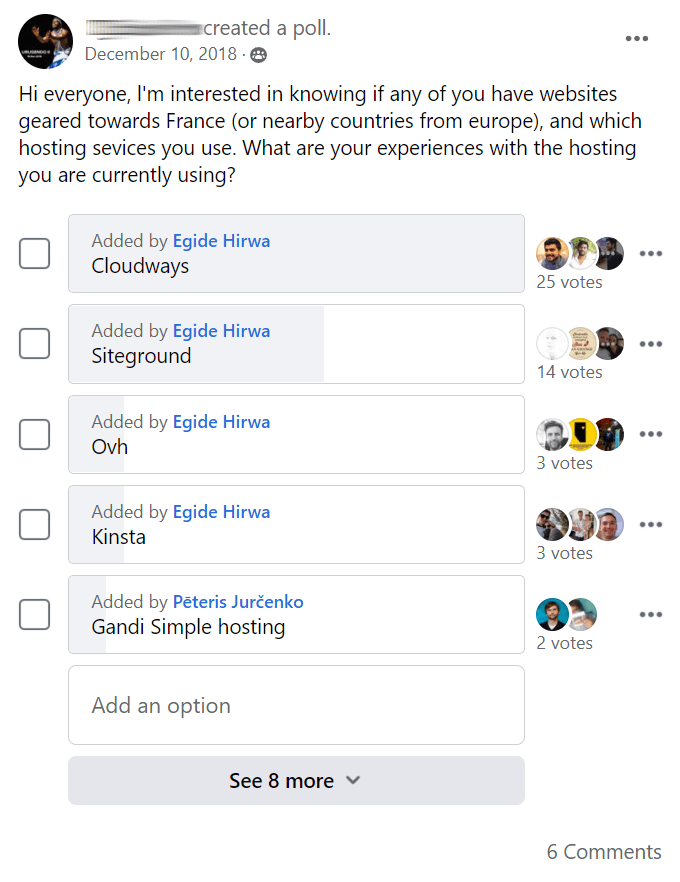
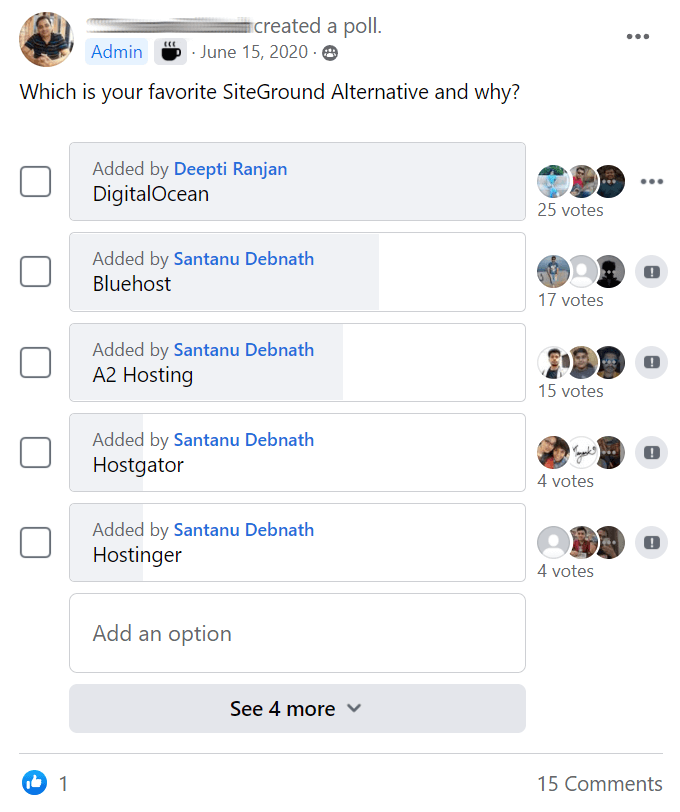
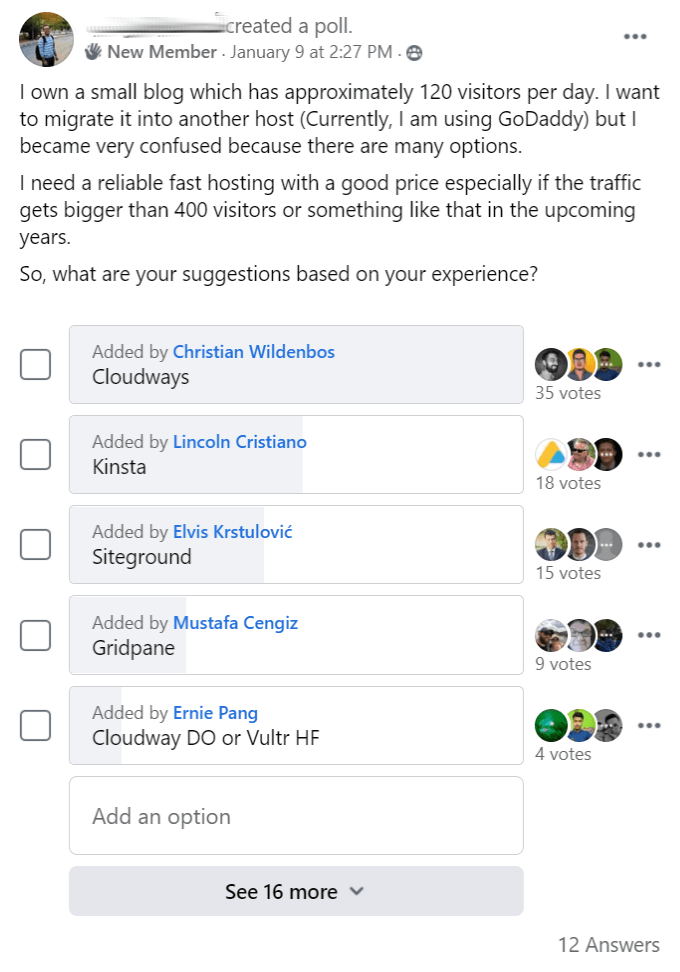
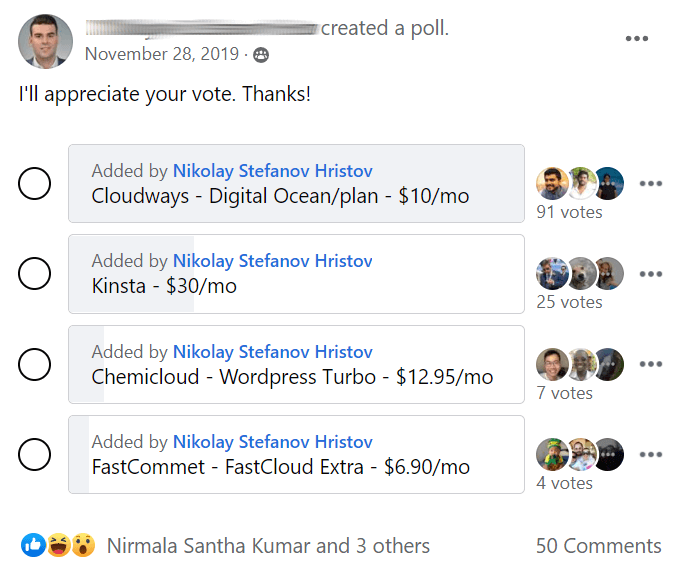
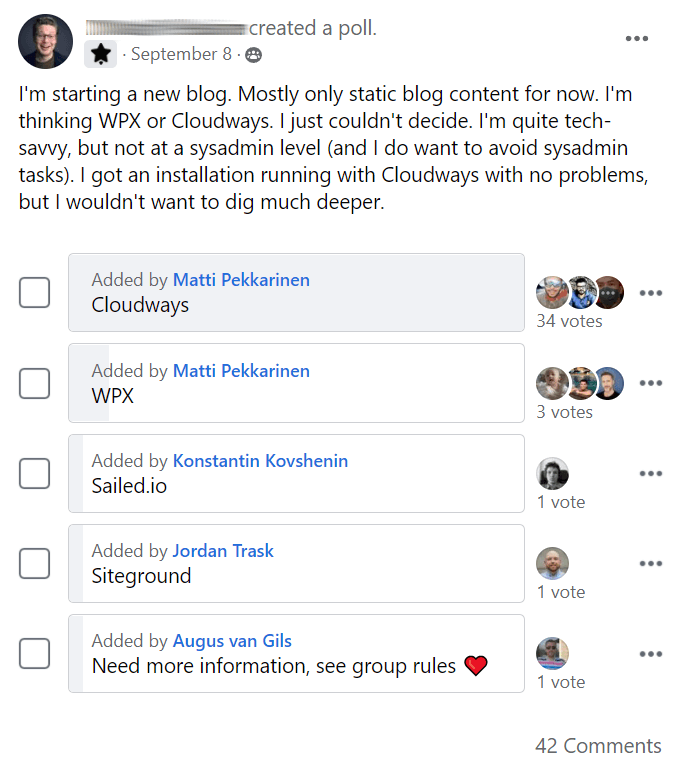
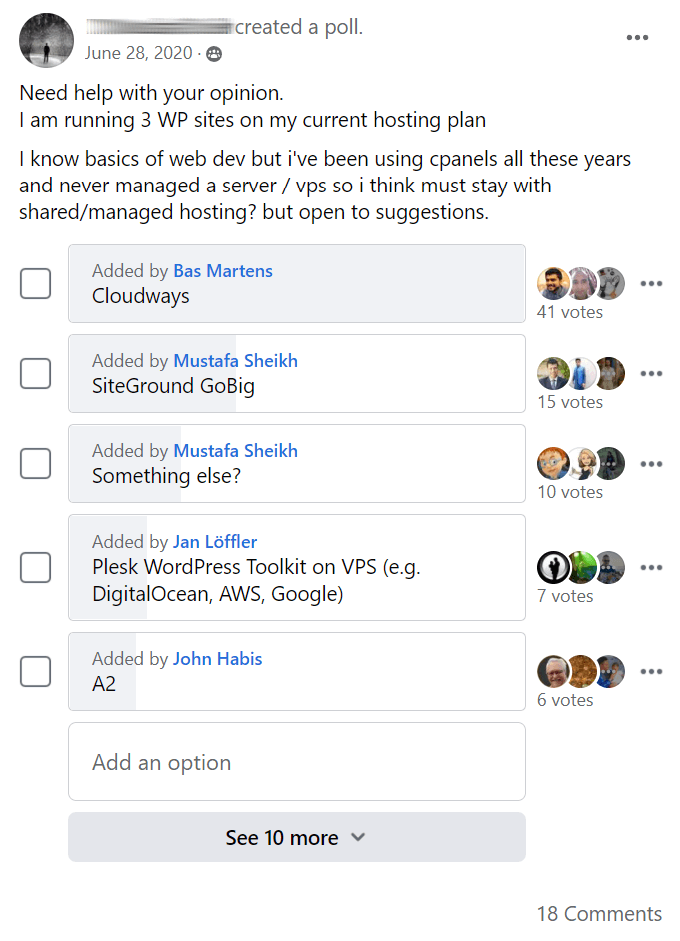
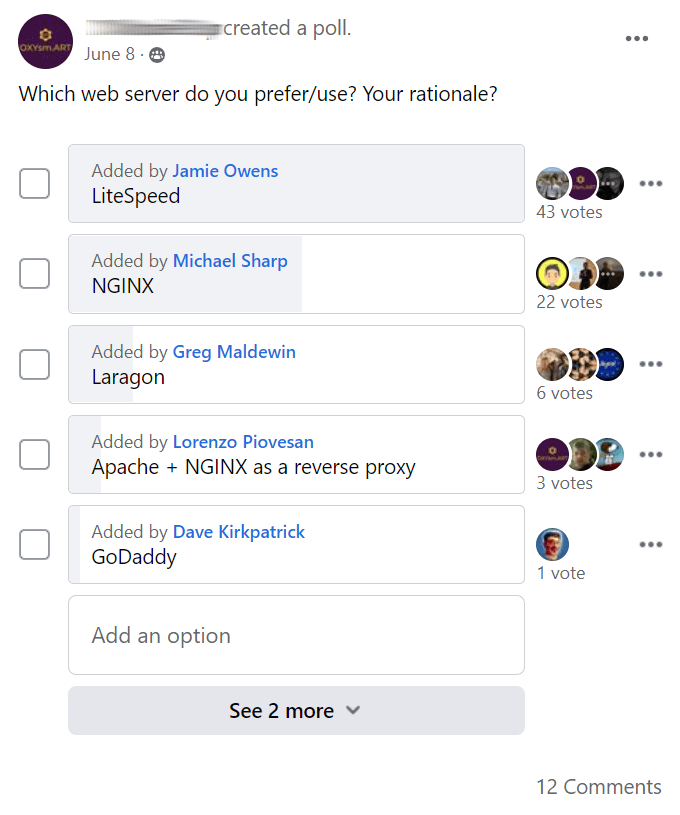
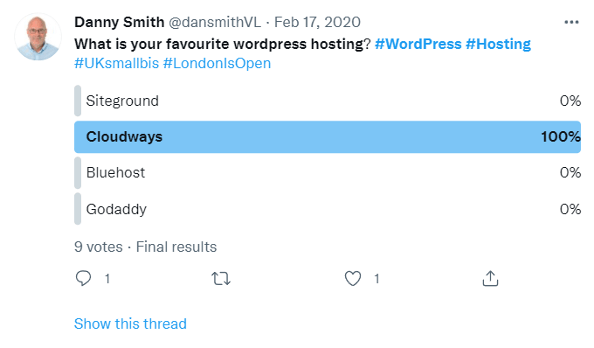
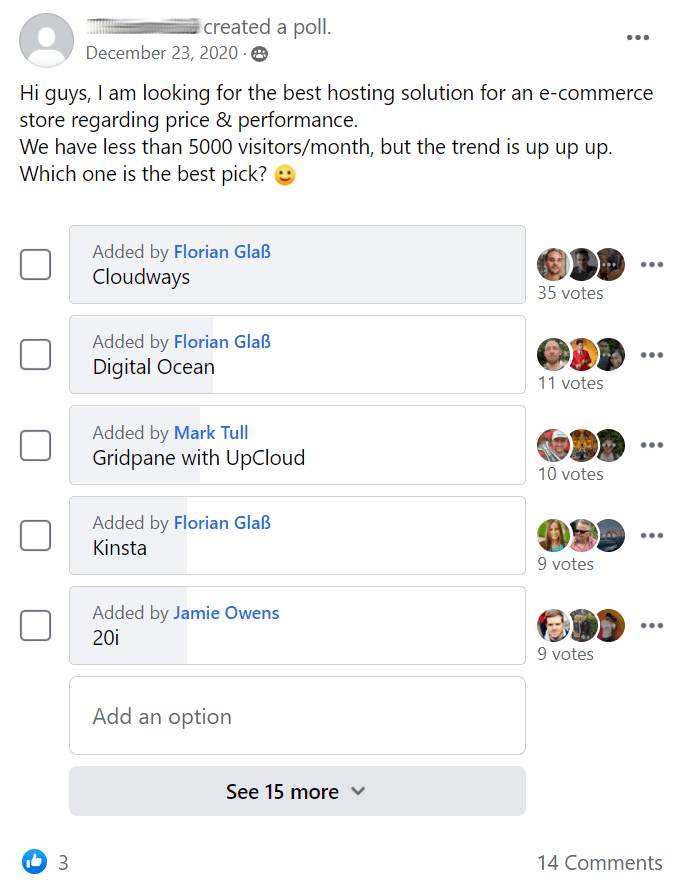
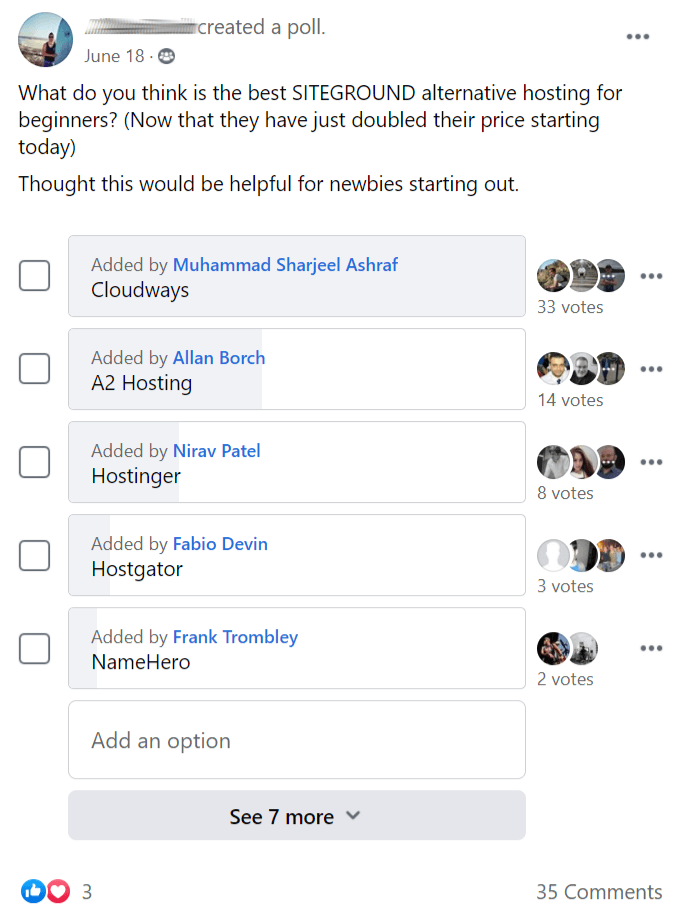
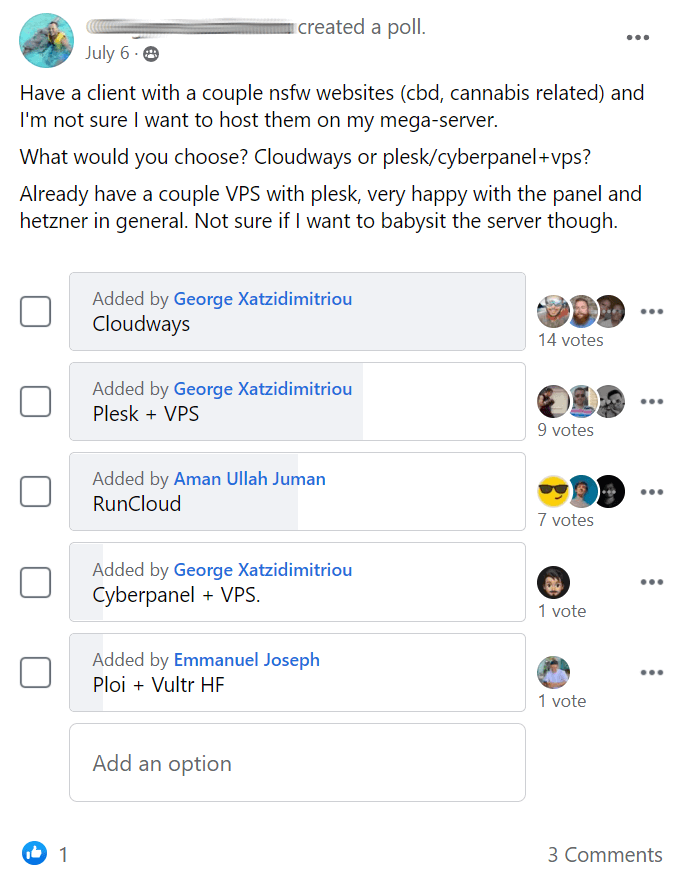
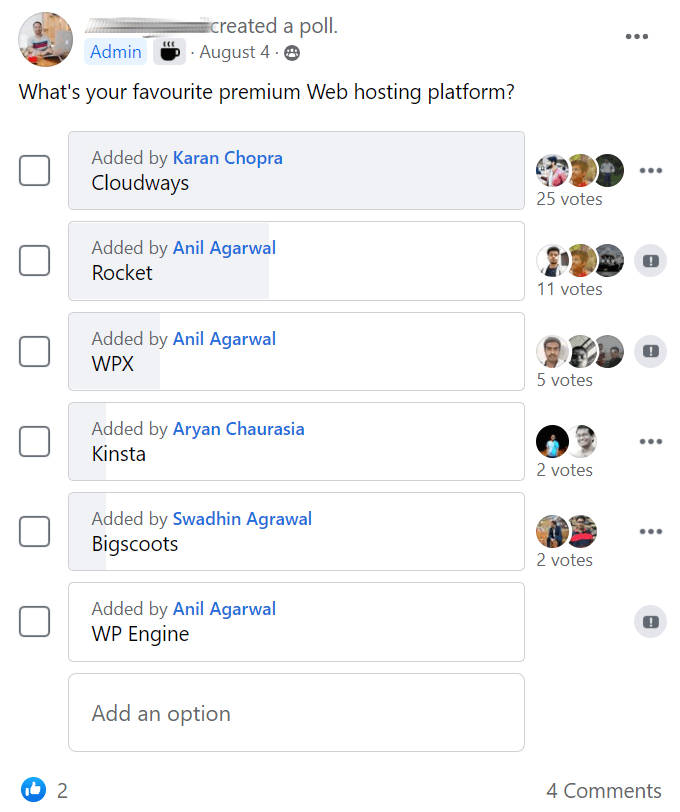
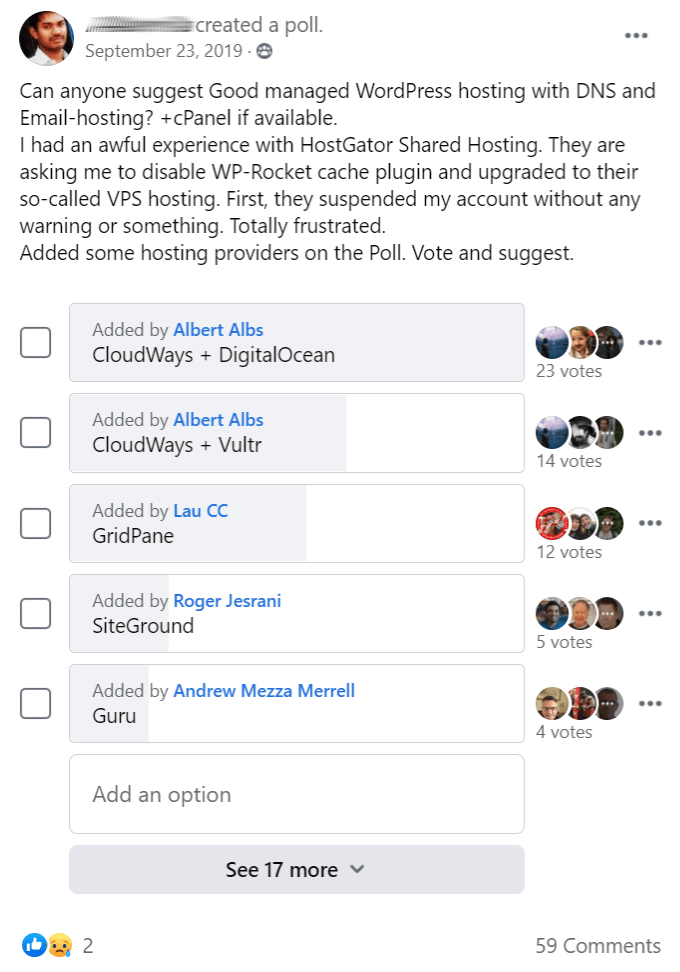

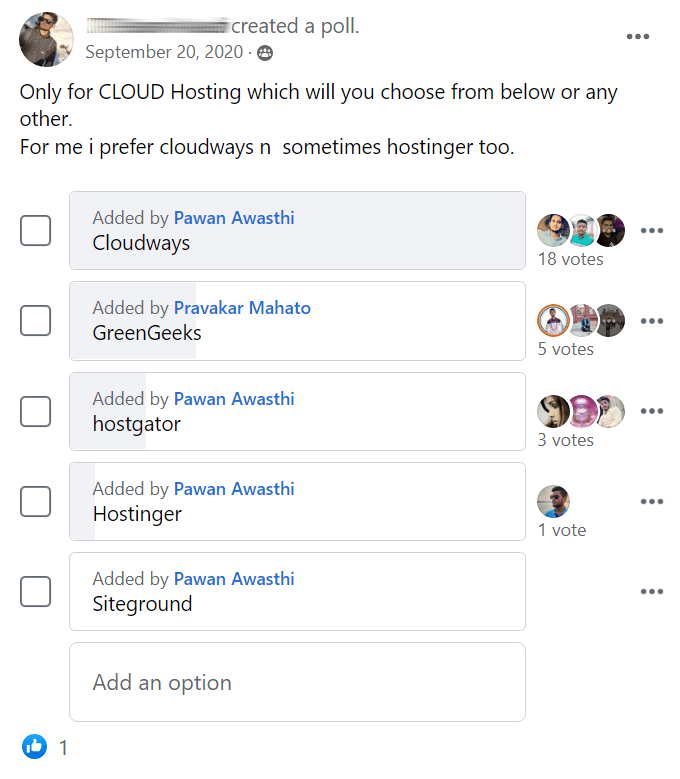
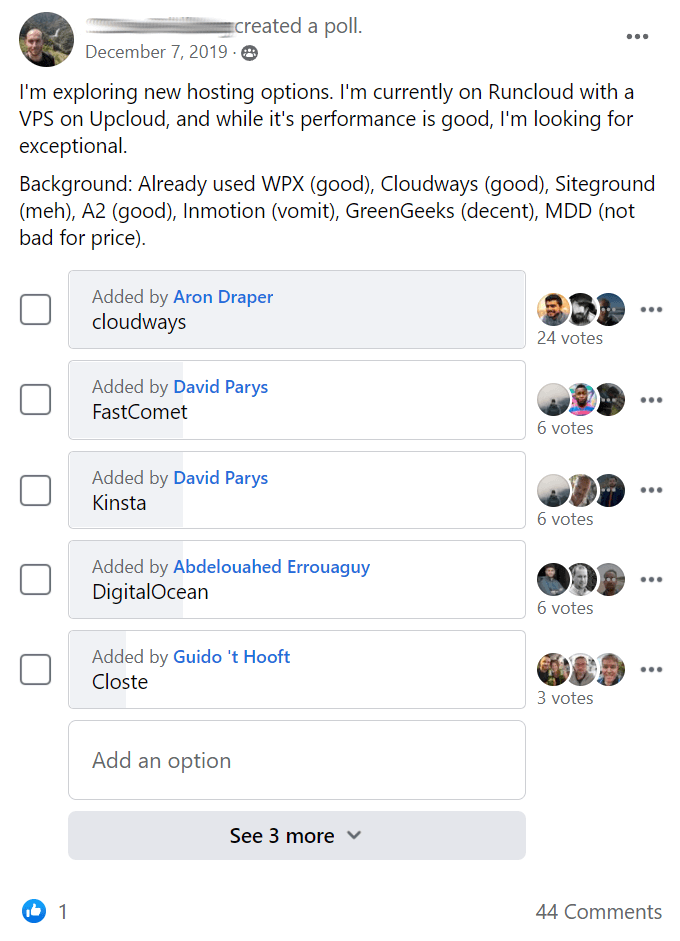
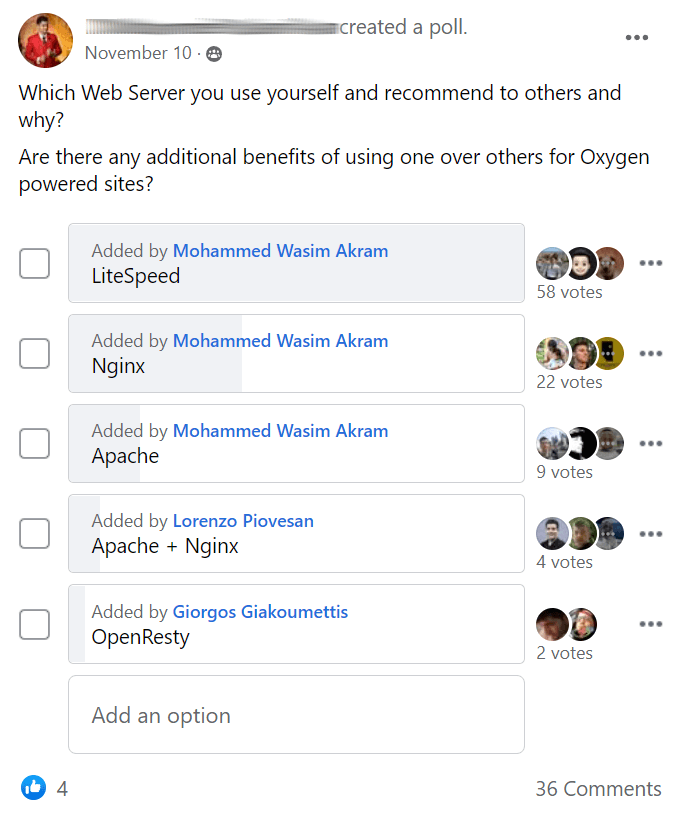
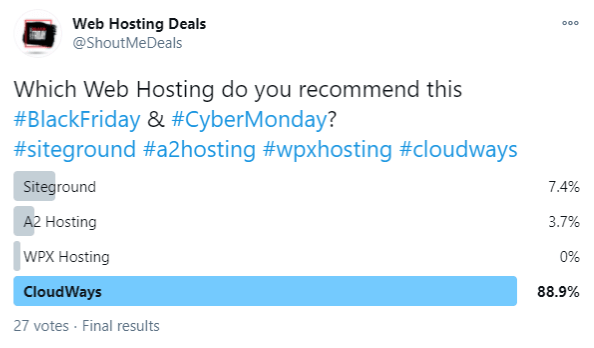
23. Why I Moved From Cloudways To Rocket.net
Rocket.net is faster, has a better Cloudflare Enterprise integration, you get more resources without worrying about CPU usage (like 32 CPU cores + 128GB RAM on all plans), and their support is much better. Plus, it’s still cloud hosting with NVMe SSDs and Redis/Redis Pro like Cloudways. It’s also much more hands-off with no need to configure server/application/CDN settings. But, they will probably cost more than Cloudways. Here’s my full Rocket.net review.
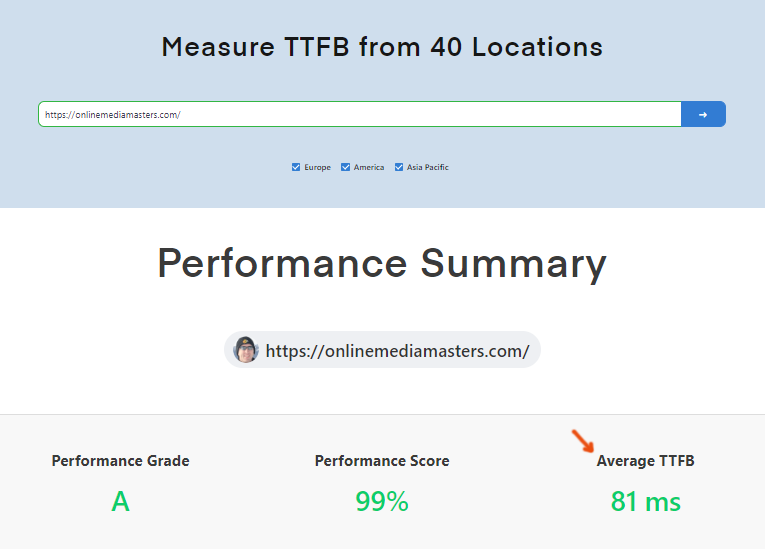
Final Thoughts – there are plenty of good cloud hosts and Cloudways is just one of them. Try them out and see yourself. They do 3-days trials, a free migration, and here’s 30% off 3 months.
Cheers,
Tom


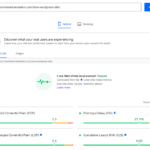
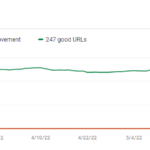
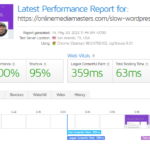







Hi Tom
I was wondering what was happening with Cloudways Vultr HF. You cannot access it from their website anymore. They have discontinued the service, which created a lot of consternation in cloudways facebook group.
I notice that if you click on your promotional links for 30% off 3 months, you seem to still be able to signup for Vultre HF.
Is this true? If so, is it worth signing up for because will they just move those on Vultre HF across to digital ocean at some point?
Thanks
Rodney
Very good test analytics and review! Will click through your link to order. Just one question: what makes you prefer Vultr HF than the DO premium? On paper they look very similar. Thank you in advance.
Hey Charles,
I tested both when I originally signed up (years ago) and found Vultr HF slightly faster. Also saw this kind of feedback in FB groups, so I stuck with Vultr. Not sure what kind of changes DigitalOcean has been making after the Cloudways takeover but that’s what I got. And thank you for using my link. I will update this review soon with more details.
Hi Tom,
Can you please compare WPMU DEV’s Hosting plans? They certainly look like they could compete with Cloudflare and their reviews are quite polished.
Would be appreciated to get your feedback on them as there’s not much reviews online about them.
Appreciated!
*I meant Cloudways lol
Yes I will try to do them in the next few months.
Hi there, I really appreciate your articles!
I love the content and recommendations of your website, so Smooth navigation, and too fast, love it.
Currently, I’m Using GoDaddy Should I Move To Cloudways ..? Please Suggest Me.
It’s definitely a big upgrade from GoDaddy, yes.